#also like BOTH the text and subtext should be looked at. both of them
Explore tagged Tumblr posts
Text
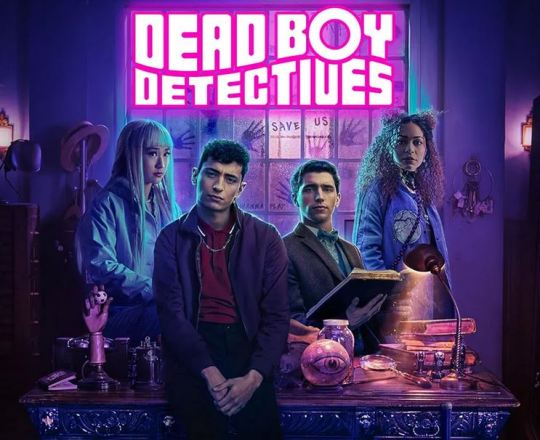
Alright. It is time. Buckle up.
Why you should be watching Dead Boy Detectives: the targeted-specifically-at my-readers edition.
Meet the leads, our two ghost boys:
Edwin Payne: Fussy, repressed intellectual type from the Edwardian era. Exceedingly gay for his partner and best friend. Tortured in hell for seventy years on a technicality because he was ritually sacrificed as a prank gone wrong. Endearingly awful at people and dealing with emotions or his own wants.
Charles Rowland: Impulsive, people-pleasing wildcard from the 80s. Heart eyes 24/7 at his best friend but has zero self-awareness. Badly abused by his asshole of a father. Beaten to death because he saved a kid from bullies. Endearingly awful at sorting his own emotions or talking about his problems.
Some highlights:
/slaps hood you can fit so much trauma in these two
Both leads get sobbing breakdowns that happen on screen. The actors are incredible at crying
Both leads get much-needed hugs
The absolute devotion between the two of them. The shared history that lives in their dialogue and how they work together like people who have been each other's Most Important Person for literal decades
I mean, I'm talking in-canon Orpheus and Eurydice reference level of devotion here
The protective way Charles puts himself physically between Edwin and damn near every threat in the show
They're just fun together. Their interactions and banter and how they work as a team is a delight
Their shared plot arc literally involves them learning to talk to each other and communicate more so that they can be there for one another about their respective issues
The symbolism. God. They are metaphorically and literally one another's light in the darkness
But what about stuff that isn't the main duo? Just wait, there's more:
This show is unabashedly, unapologetically queer. It's there in the text and the subtext. The whole show lives and breathes it
So many good, complex, well-written female characters. The Bechdel test gets blown straight out of the water in episode one and they never look back. Headstrong amnesiac psychic learning to be a better person! Quirky meta commentary matchmaker! Cynical lesbian butcher! Delightfully sadistic witch! They are all amazing.
[audience voice] But I'm here for the hurt/comfort. How can I whump ghosts? Worry not, my friends. Canon has you covered. Not only are there ways, there are ways that happen on-screen. The hurt/comfort and rescue are also on-screen. Yes, it is amazing
Absolute chaos, really cool supernatural cases and creatures, a surprising amount of humor, charming writing, and a cast that absolutely nails it on the acting and chemistry
There is an extremely suggestive trickster type who is also the king of cats. He's a cat in human form. He hits on Edwin nonstop. Charles gets blisteringly jealous
All of the leads have well-thought-through, fully developed, emotional character arcs. They're all messy and flawed and sometimes lash out in their pain, but at turns can be incredibly supportive and kind and loyal
A character who is a crow who is also a boy, who is tortured by his witch/creator and also is crushing hard on one of the leads
There are so many incredible details in the setting, costume choices, prop decisions, etc. that you only catch after you know what it's laying the groundwork for. The level of care that went into this show is phenomenal
It's only eight episodes. The time investment barrier to entry could not possibly be lower
Anyway, tl;dr, if any of this sounds appealing to you, you should give this show a watch.
Dead Boy Detectives is well worth your time. It's easily my favorite show in years.
#dead boy detectives#dbda#dbda spoilers#edwin payne#charles rowland#payneland#whump#hurt/comfort#lgbtqia#netflix
1K notes
·
View notes
Text
3 Levels of Queerness in Jujutsu Kaisen
There are obvious, less obvious and ghostly queer characters in JJK, and I thought of writing them down in order of textual presence.
(Text, subtext and interpretation, are not interchangeable concepts.)
Text: trans, genderqueer, genderfluid
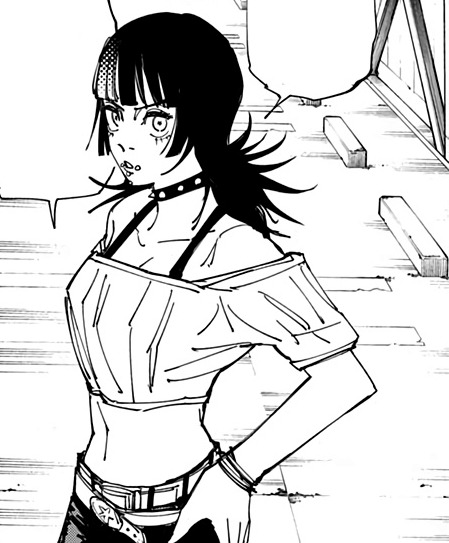


Even though Kirara is neither called trans nor does she call herself that, the manga (a shonen title in Weekly Shonen Jump, that's why the word trans doesn't appear) couldn't be more explicit that she transitioned from male to female. Gege achieves this with contrast: Kirara couldn't look and act more feminine while Panda confirms to Megumi that she's male.
Some might argue that Uraume is also trans but I'd say they're presented to be a mixture of genderqueer, non-binary and bigender. Eg. the first mention of them explicitly says they're androgynous. The manga then makes sure that we never get a clear explanation of their gender, neither with characters talking about them, nor with a drawn panel of their body, nor a difference in their appearance in the present and the past.
The later reveal from Gege that Uraume was originally male and was then reincarnated into a female body should, in my opinion, not be understood as a starting and endpoint of a transition, but as a timeless "inhabiting both a male and female body".
Kenjaku doesn't need much of an explanation as he (or she or they) has no problem inhabiting male and female bodies. He jumps wherever he wants to go, but unlike Uruame, he isn't androgynous about it; he clearly presents as male or female. He also never comments on changing his gender so genderfluid is the best description for him.
Subtext: bisexual

I have seen many, many people not understanding what subtext is, so here is an explanation for that first, taken from Wikipedia:
Subtext is "the underlying or implicit meaning that, while not explicitly stated, is understood by an audience."
Is Kirara being trans subtext? No, because the contrast that Gege uses for her reveal is too heavy for that and straight up slaps you in the face. But Megumi's first interaction with Todo and subsequent implications aren't.
Todo asks Megumi what type of woman he likes. Then he adds that he can also like men.
In Japanese, it's common to either omit gendered pronouns or use words for "person" that don't have a gender marker either. This does not mean that everyone talks queer with each other. In context, everyone knows about who or which gender someone talks about, and in 99.9% of the time, heterosexuality is the underlining assumptions and reality everyone brings to the table for those conversations.
Todo, however, expands that context into gay territory and that for the only time in the entire manga. Answering without gender markers now is an explicit acknowledgement of that new context. In this case: that Megumi is interested in both men and women.
Subtext, baby.
(Additional subtext here is that Megumi has a one-sided crush on Yuji. This comes from his answer to Todo about liking people who are like his sister. And who is someone he constantly compares to his sister? Yuji.)
Interpretation and Metatext: gay couple

Satosugu is probably the one where opinions vary the most, and as I don't care in any way about this ship, I can't make a comprehensive list of canon interactions and themes about them being (spiritually) together. From what I've seen talked about, some basic facts have to be laid out first.
Canonically these two are not a couple nor are they portrayed as gay in a textual way. Geto and Gojo have room for queer readings of course, especially in relation to each other, but any subtext you might see for them can also be interpreted differently. What these two have between each other is something we've seen in countless other explicitliy heterosexual manga as well.
But here comes the big But (from someone who is bored to tears by stsg): Unlike other shonen best buddies turned enemies, there is a solid foundation for a gay interpretation. A metaphorical groundwork for Gojo and Geto being star-crossed lovers who couldn't be together/get together just to end in tragedy with one of them having to kill the other.
What's unique with these two and with JJK overall, is that the author, Akutami Gege, is also a fan of gay stories. That man is a fudanshi and has listed BL titles as his favourites. The metaphorical groundwork for satosugu is in how they're portrayed in the manga, coupled with how Gege could write them like that intentionally.
(Really often, anti ship people will say things like "the mangaka would never write them like that, he would never want them together, it's illogical to push a queer agenda onto an author who has nothing to do with queer things." Well, Gege has sth to do with queer things. He reads and likes them and is open about it, too.)
As a reminder: Japanese society is rather conservative especially when it comes to demographics that WSJ aimes their titles at. If Gege wanted to write a battle shonen with an explicitly gay protagonist, WSJ would gently push him towards another publication or make him change his mind. Outside of a little bit of subtext, they would also never allow a male protagonist to be queer in any way.
On a metatextual level, Gege would be open to write a tragic gay love story but the place he could write it in wouldn't allow for it. This gives weight to any gay interpretation of satosugu that other pairs like them don't get because their creators aren't known for being open to queer writing.
-
That got rambly at the end but when it comes to stsg my thoughts aren't that concrete because I simply don't think about them that much. But as a quick recap this late into the night: Kirara, Uraume and Kenjaku are textually queer (canon). Megumi is subtextually queer (canon). Satosugu is widely open for a queer interpretation (non-canon).
I'm open to discussions of course :D
#jujutsu kaisen#jjk#fushiguro megumi#yuji itadori#gojo satoru#geto suguru#itafushi#satosugu#fushiita#kirara hoshi#uraume#kenjaku#jjk kenjaku#queer#gege akutami#brought to you by an angry anti stsg anon in my inbox#congratulations buddy you made me talk queer about jjk#itadori yuuji#evershipping
103 notes
·
View notes
Text
Tried to write this on reddit but the post was too long and thought I’d throw my hand in the tumblr ring:
My interpretation on why Colin’s arc this season matters so much to me.
The benefit and the curse to this season is that to understand the full story arc of Colin and Penelope you have to watch all three seasons. I feel like they could have been more blatant in the text and given them more scenes in part 1 to completely flesh this out and remind the viewer what they’ve been through, but this is all in the text (past seasons) and subtext up until the carriage speech.
Season 1 Colin is romantic and naive. He becomes infatuated with Marina almost at first sight and still probably believes in fairy tale romances. Marina herself says that Colin is eager and does not guard his affections. Anthony has his duties as head of the family, Benedict has his bohemian pursuits, both of them are known flirts and rakes, frequenting brothels often and having had a world of experience. It’s implied that Colin is a virgin and when he proposes to Marina, Anthony scolds him for his naivety and suggests he should have been taken to brothels to be a man and “wet his wick” as if he were experienced, he wouldn’t be so hasty to marry someone he didn’t know. Colin doubles down in his commitment to Marina which then ends in tragedy when it’s revealed she’s pregnant. He understandably falls into depression as he had chosen a purpose (to be a loyal husband in love) and he had gotten screwed over due to his naivety. Colin also has a bit of hero complex, which we can see multiple times throughout season 1 such as when he dances with Pen after Cressida spills her drink. In his duty and loyalness, he confesses that he would have married Marina if she had told him the truth. Colin is very loyal and very protective of those he loves and he sees his value in how he can help and protect others, and having them need him. He makes the decision to do the thing he always wanted to do, travel, as Pen kept reminding him, as a way to become literally, more worldly.
Colin returns in season 2 and finds that people aren’t that interested in his travels nor did they particularly miss him while he was gone, the exception of which was of course Pen. He tries to speak to his family and gets shut down. He feels isolated once more and then also realises he still doesn’t have a sense of purpose, nor does anyone need him. It’s implied he is still sensitive because despite travelling, Colin is still not the man the ton expects him to be. He visits Marina in some naive hope, and she basically tells him to grow up and move on with his life. Penelope and he have a lovely conversation about purpose. He looks into various pursuits and then as we know he gets to be the hero again when he discovered Jack Featherington is swindling the ton and saves the Featheringtons. But Colin is still beheld to the expectations of the ton and when the men are finally paying atttention to him at the ball, he says he would never court Penelope in an attempt to fit in, even though we’ve all just clearly witnessed him go out of his way to save her.
Colin leaves again, and this time he vows to be a changed man. He sleeps around, “grows up”, learns how to be charming and finally when he returns is he warmly greeted by all the women and the men as the ton finally recognises him as a man. Anthony and Benedict clap him on the back, the ladies fawn over him, and men like Fife and Cho engage with him in a way we haven’t seen since he told them he wouldn’t court Penelope. He plays aloof with stories of his travels because he knows the mystery makes people more intrigued than when he told them everything (telling his family he doesn’t remember how many cities he’s been to, and then telling Pen it’s 17 because he knows the answer), and in some cases he is still not comfortable or willing to share personal details of his sexual exploits because he’s still a romantic at heart. Colin feels like he’s nailed it.
Except. He hasn’t. It’s only surface level. The cracks first emerge when he approaches Penelope at the debutante showing, going out of his way to find her (as he always does). She seems closed off and has not written to him all summer. Previously she was the ONLY one to engage him, and probably the only one he could be himself with. Yet that one connection has completely gone. This is pure speculation and unlikely to ever be confirmed, but without Pen’s correspondence it may have even been a catalyst for him to change himself/seduce women. You can tell he’s nervous approaching her, even with his new aesthetic, which he himself remarks are only clothes. She’s closed off and basically dismisses him, probably leaving him feeling a bit stupid. He sees her glow up at the ball (:o) and while he does not approach her but continues to watch her, he runs after her immediately when she runs out, in care for her wellbeing and also because he knows the conversation he is having with the lords is super shallow. She dismisses him again, and then tells him it was his grave error in trying to fit in that made him lose his one deep connection. And then he vows IMMEDIATELY to make amends, calling upon her the next day to make it right. It is his first real and honest conversation. He tells her charm can be taught (he’s faking it), that he seeks her out because she lifts his spirits (he never looks happy in a public setting unless he is with her) and that hers is the one person whose opinion matters the most.
So:
1. Colin was a naive romantic who felt like he had to conform to the approved of society
2. He is faking his true personality (shown in his heartfelt conversation with Pen, how despite everything he seeks her out and values her the most, that he lies about how many cities he’s been to just to seem cooler)
3. He is fighting against societal expectations
4. At this stage he’s still trying to have it all - the women, his family’s approval, the ton’s approval and Pen’s approval.
He goes home and is furious with Lady Whistledown because she has called out his obvious ruse, and he is upset that what he is trying to fake is so obvious.
Episode 2 rolls around and he doesn’t do much except follow her around and fawn after her. His new interests have started to fade immediately as soon as he starts speaking with Pen again. He tells her to be herself and act like they did when they were kids - which is hilarious, considering Colin has attempted to change everything about himself to NOT be himself and NOT act like an adult (the irony Colin is not aware of). It’s her compliments of his writing and his eyes that make him flustered. He entertains women and men at gatherings, but is always looking for her and physically not pleased when she speaks to other men. He laughs with her (honestly, first moment of pure childhood glee for him and he makes a pun which was reminiscent of earlier seasons Colin). He runs after her again and emotionally argues with Eloise, because damn the ton it’s Pen he cares about (my poor sweet boy). He’s so loyal and protective of her. He doesn’t even attempt to dance with anyone at these parties. Hes so distraught she could be suffering that he goes immediately to her, damn the rules of society, and agrees to kiss her and even tries to keep going before she leaves. Because he finally realises that his feelings for Pen are romantic, that it’s not just friendship that he seeks, but a true romantic relationship with his best friend.
He’s awkward and cute as he approaches her the next day, which is the complete opposite of how he’s been trying to act - she is making him act like his former self, his true self. She tells him they should keep their distance and he reluctantly puts on the armour again.
But, Colin actually lasts for like a day before he realises he will go crazy if he does not confess his feelings to Penelope and the entire facade that his has created has completely crumbled by this point - the obsessed boy is BACK. He stops talking to the women in the ton, expresses 0 interest in sex with the prostitutes, entertains a drink with the other lords before going off at them for how shallow and meaningless and fake they all are, and then commits several social faux pas pursuing Pen because he doesn’t care about anything except her anymore.
His confession in the carriage is the culmination of all of this. He’s tried to feel less (because he was too sensitive), he’s tried to grow up (and be a man), he’s tried to flirt and be a rake (because he was too green), and he’s tried to fight against expectations (Penelope not being desirable) but what is the point because all he wants and his entire happiness is centred around Penelope and if she rejected him or married Debling he would have nothing left.
Colin Bridgerton does not care anymore because he is #1 loyal obsessed protective boy and he will go through heaven and earth for Penelope and I love him so much for it.
#bridgerton#polin#penelope featherington#colin x penelope#colin bridgerton#bridgerton season 3#bridgerton s3
175 notes
·
View notes
Text
Queer Text/Subtext in Shallow Grave (1994)
CW: BLOOD, STABBING, MURDER, NON-SEXUAL NUDITY, DRUG USE
I guess I wrote a rough essay... about the queer subtext in Shallow Grave... Here... have the rough draft if you'd like...
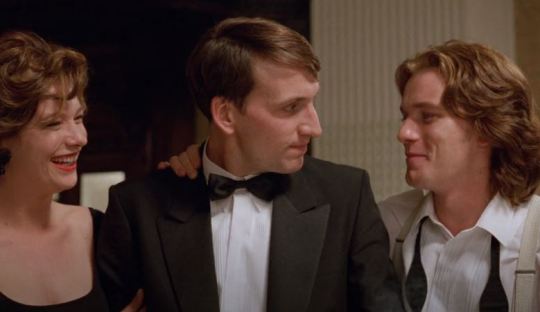
Overt references to queerness:
When we look at contemporary movies, we often have a knee-jerk reaction to dismiss any “funny” references to queerness or sexuality to be taken as jokes and nothing further than that. Unfortunately, this has become all too common, and does a disservice to the films we watch. So I will be taking every moment of referenced or implied queerness as serious, even if it is delivered in a humorous way. Especially because this movie is not meant to be a comedy (despite some humorous moments).
Furthermore, references to queerness in movies should be taken seriously because they establish not only the existence of queerness (in universe, as one might say), but can also demonstrate the character’s attitudes towards queerness. Its important to notice that at no point in this movie are any references to queerness played for a laugh – they might be humorous, but we are not meant to laugh at the character for being queer, which indicates that queerness is taken seriously within the universe of the movie (or at least between the characters).
The first overt reference to queerness is when Juliet asks an interviewee if he is having an affair with a man or a woman and the man is not given screen time to answer. This same man bursts into tears after Alex, a man, says, “When did anyone last say to you these exact words, ‘you are the sunshine of my life’?” (this is a reference to the Stevie Wonder song of the same name). While it is technically (according to the script) said by Alex to a different interviewee, the arrangement of the shots does not indicate that, as it cuts directly from Alex asking the question to the man crying. This could imply a number of things.
The second overt reference to queerness comes at the charity ball, where a Scotsman says, “ladies and gentlemen, and those of you who are neither or both,” which is then met with a drumroll. Alex immediately responds, offended, “where did they dig him up?” implying that Alex finds the joke to be outdated and, perhaps, distasteful.
The third overt reference is when Alex dresses in drag. He also appears in the same scene, on the tape recording wearing some rather flamboyant costumes. The fact that Alex is in drag is not addressed by any of the other characters, nor by Alex, indicates that this is either a usual occurrence, or, for some reason, entirely unremarkable to the characters. Specifically, it is interesting that David does not comment on it, as he walks into the scene unsuspecting.
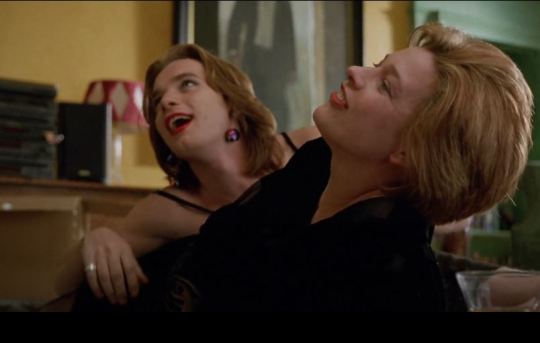
The fourth, and final, overt reference to queerness is when, upon being told of Juliet and David’s relationship, Alex says to Juliet, “I’d do exactly the same thing except I don’t think I’m his type.” If the line is interpreted sarcastically (which I think most viewers will) then we can assume that he is jealous of David for being with Juliet. If it is interpreted as earnest, then we can assume that he is jealous of Juliet for being with David. It also could be an ambiguous combination of both.
Queer Subtext:
Now let us dig into the subtext, which I actually find to be much juicier....
The Squash Scene and the Car
Directly after the interviews have concluded, we are given a scene which helps frame the relationship between the three characters as one built on dynamics of domination and submission and gives us a baseline to understand each of the character’s roles within this dynamic. This scene takes place on the Squash court.
There is a deviation here between the script and the film, as several lines have been cut, but I will include them as they add some context to the scene.
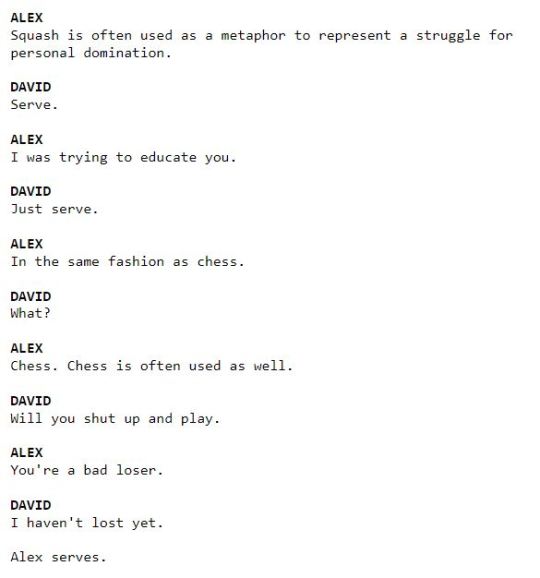
In the above text, Alex indicates that he sees this game of squash as a struggle for dominance. In this case, the game between Alex and David is won by Alex, who then, despite having called David a “bad loser,” demonstrates that he is a sore winner when he gloats over David by saying, “defeat, defeat, defeat – sporting, personal, financial, professional, sexual, and everything.”
David is clearly annoyed by this and storms off. This scene sets up the ongoing power dynamic between Alex and David in which Alex is the dominant one in the relationship. It also is the first time that we see David being emasculated by Alex, which will continue occurring for the first half of the movie.
Immediately after David leaves the court, Juliet takes his place to play a match against Alex. In this scene she is wearing a rather masculine outfit which is similar to that of the two male characters. She also sports short hair throughout the movie, but this is the scene in which she appears the most “boyish.” When she enters the court to play, Alex begins to make the same statement (“Did you know squash is-”) that he made (in the script) earlier, to David. Thus he is using this exercise as a way to exert dominance, not only over David, his male sexual rival, but also over Juliet, thus implying that she is on equal footing – therefore also a sexual rival. However, Juliet cuts him off and tells him, “Alex, just serve.”

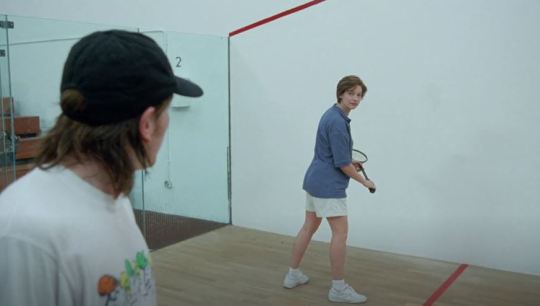
The action of cutting off Alex denies him domination in that moment, thus establishing that the two of them are on much more equal footing, or possibly that Juliet is in fact the dominant one between the two of them. This scene serves to establish that typical gendered dynamics are somewhat blurred between these three individuals, and that David, instead of Juliet, takes on the most feminine/passive role in the group.
The next scene once again highlights the complicated gender and power dynamics within the group. Juliet drives the car (masculine) while Alex and David bicker with one another from the back seat and passenger seat, respectively.
In this scene, addressing Alex’s win, David says, “Victory is the same as defeat – it’s giving into destructive competitive urges,” which distances him from competition, and could be interpreted as him rejecting the masculine urge to dominate. Alex, in return, emasculates him by belittling his reliance on a “discussion group,” (implied to be therapy). During this scene, Alex and David are looking at one another, however, the rear-view mirror blocks both of their eyes. This symbolizes their unwillingness to see “eye-to-eye and perhaps a certain level of repression between the two of them. Also in this scene, Juliet physically dominates Alex by elbowing him in the chest, and attempts to emasculate him verbally by implying that a woman that he is interested in hates him. She does this specifically in response to Alex’s emasculation of David, thus establishing that while Alex might be dominant over David, she is dominant over him. During this exchange, however, in her attempt to protect David from Alex, David is further emasculated because he relies on someone else to defend him.
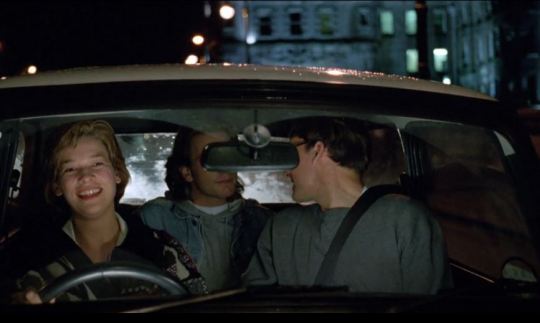
Discovering the Body / Three Friends, Three Bodies
When the trio discovers Hugo’s body we see some more of this interesting dynamic.
David stands by shocked while Alex ransacks the room searching for paraphernalia, while Juliet (the doctor among them) attends to the body.
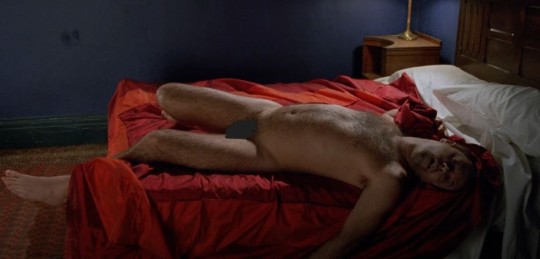
Hugo’s nude corpse in this scene represents male vulnerability. He is prone and exposed on the bed, having overdosed on heroin, and can do nothing while his privacy is violated (by the dominant, Alex). The injection of drugs into the body, in this case, could also be said to symbolize emasculation - the breaking of the body barrier through penetration of a syringe (phallus). This exemplifies a significant cultural fear at the time – death of the male body via penetration, which had become a major concern due to the HIV/AIDS epidemic. (If I was writing this essay for real, this is where I would insert articles that demonstrate horror’s preoccupation with AIDS and gay stuff during the 80s and 90s, but this is just for fun)
David, of course, is enamored by this display of the fragility of the male body. I would suggest that he identifies with Hugo’s vulnerability in death, and that the treatment of Hugo’s body by Alex and Juliet mirrors the way that they treat David. While Alex takes advantage of Hugo’s vulnerability in death by violating his privacy (thus dominating it), Juliet emasculates Hugo’s corpse by tending to it. In one shot, we also see Juliet’s fingers dangerously close to penetrating Hugo’s mouth.
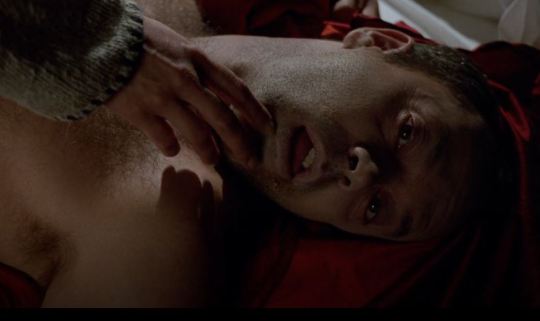
We can also expand upon this by recognizing that the two male characters that are pursuing Hugo and the trio in search of the money, are parallels to Juliet and David. The two men are able to dominate Juliet and Alex through violence, only then to be killed by David. Thus, the three bodies that the trio end up burying are parallels to the trio themselves.
David Overcomes Emasculation, Alex Becomes Emasculated.
Alex’s emasculation of David continues throughout the first half of the movie, culminating in David being forced to dismember Hugo’s body (the very body that he identifies with). When this occurs, he becomes the violator/aggressor/dominator.
This occurrence proceeds the change in the group dynamic. Around the midpoint of the movie (during the charity ball) we see David transition into a dominant role in the trio, while Alex becomes submissive.
This is demonstrated first by Juliet dominating Alex while they dance. Alex falls to the floor, drunk, and Juliet takes that moment to step on Alex’s mouth, forcing him to lick the bottom of her shoe. He then willingly kisses her ankle, meeting her eye contact submissively. It is made clear through his facial expressions and laughter, that he finds joy in this act, thus embracing the emasculation (whereas David had always responded poorly, rejecting it).
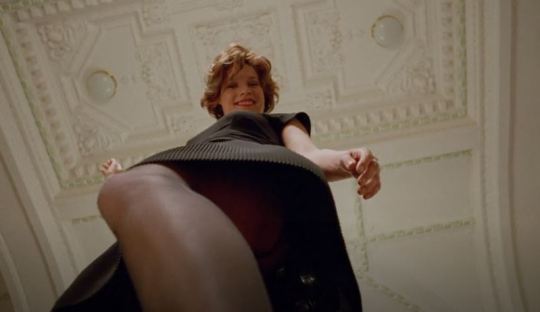
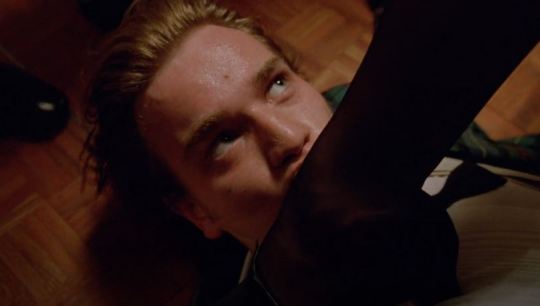
Alex then attempts to re-exert control over David by forcing him to toast when he doesn’t want to. David eventually concedes after Alex yells at him, demanding that he toast to “love and happiness forever.” (Alex also humiliates and emasculates Cameron in this scene).
David finally exerts control when Brian McKenly (a man keen on pursuing Juliet) interrupts their conversation. David responds by standing on level with Brian and stating, “If you want to talk to my girlfriend, you talk to me first. If you want to dance with her, you apply in writing three weeks in advance or you end up inside of a fucking bin bag. You didn’t apply – so you don’t dance!”
While David shrinks a bit afterwards, admitting that he found the interaction stressful, both Juliet and Alex embrace him, in high spirits (one might say… aroused…). Alex exclaims, “He [David] was really good – fucking bin bag – I really liked that. You really explored your maleness to the full there! You were magnificent.” This statement indicates that Alex, who has rarely had an encouraging word for David over the course of the movie, is invigorated upon seeing that David has stepped into a dominant role, exerting his masculinity onto others. Immediately following this, Alex is assaulted in the bathroom by Cameron (who he had emasculated twice prior) and two other men, who beat him quite badly, thus emasculating Alex.
The following day, Alex’s emasculation is made complete when he dresses in drag and spends the day in debauchery with Juliet. The framing of his and Juliet’s bodies during this scene is also worth noting, as they are often visually indistinguishable from one another – with Alex being noticeably more feminine than Juliet in several shots due to his makeup, jewelry, dress, and rather delicate shoulders.
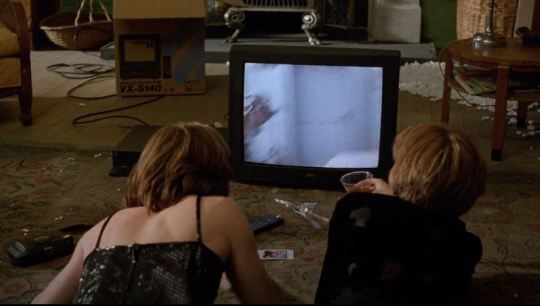
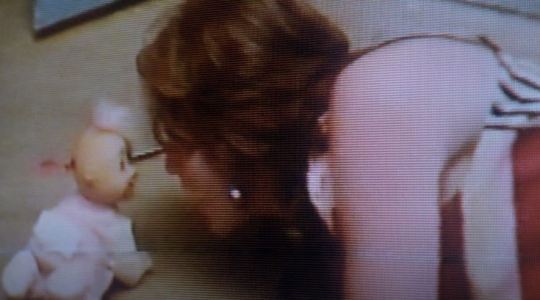
(Notably, during the entirety of the ball scene and much of the drag/video scene, Alex is often pictured smoking a cigar instead of his usual cigarette, which could be said to stand in for a phallus.)
From this point on, David is almost always dominant over Alex. (One notable exception is one moment where Alex leans in close to David during dinner and orders, “now swallow,” while making very intense eye contact. David regains control by reminding Alex that David was the one who dismembered Hugo’s body.)
After this point it is clear that David is undergoing some extreme psychological stress, and has become paranoid and aggressive. His shift in demeanor is most clearly symbolized by this shot, where he calls out of work so that he can begin making plans to protect the cash.
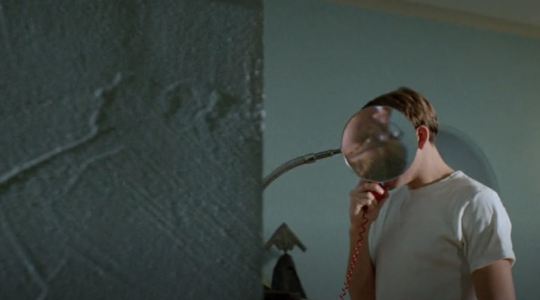
The Wickerman
During one scene, an injured Alex lays on the couch and watches the final scene of The Wickerman (1973).
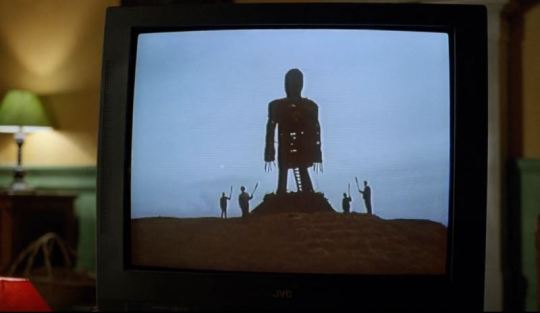
The Wickerman tells the tale of a conservative Christian police officer who goes to a Scottish isle to investigate the disappearance of a girl, only to discover that the locals are practicing a form of paganism that involves human sacrifice. The police officer discovers that he is in fact the sacrifice. It is implied that he is the sacrifice because he is a virgin and a heterosexual, and he is unwilling to have sex with Christopher Lee’s character. Christopher Lee was most well known at the time for playing the lead in Dracula (1958) – another movie with extremely well documented queer subtext. The audience of The Wickerman would have been aware of this.
During this scene, the drumbeats of the pagan ritual, where the police officer is being marched to his execution/sacrifice, synchronizes with David’s steps overhead, a sound that the characters and the audience come to associate with surveillance and dread.
Honestly this scene has me a bit stumped. Who does Alex identify with in this situation? The heterosexual victim? – is the ending subverted because his submission culminates in… the penetration of Alex's body… thus making him queer? Idk it's been a long day.
Surveillance
During the second half of the movie, David moves into the Attic and rarely comes down when his housemates are home. He is protecting the money, both from his housemates and from the men who eventually come looking for it. While Alex and Juliet are brutalized by the men, David is the one who has set a trap for them, and is able to kill them. He also leads the trio to dispose of the bodies, and drives the van (whereas Alex had driven the van the first time they disposed of the bodies, when he had been the dominant one in the relationship).
During his time in the attic, David drills holes in the ceiling so that he can spy on his housemates. He is literally in a dominant position over them, looking down on them while they go about their daily tasks. In one scene, he spies on Alex and Juliet while they are sleeping. In this scene, he is shown first to be watching Alex. David is also in a state of undress that we have not seen before, implying a certain sensuality to the observation. We do not get to see Alex in a state of undress, but the scene finishes with Alex putting his shoes on, the camera looking down from above, implying David’s Point of view, and that he had watched the whole time. After Alex leaves, David moves to watch Juliet, in a scene that is much longer and more explicitly inappropriate and sexualized, especially because we come to understand that David’s temporary attic bed is located directly over her bed. However, before she begins undressing, he looks away and holds his head in his hands.
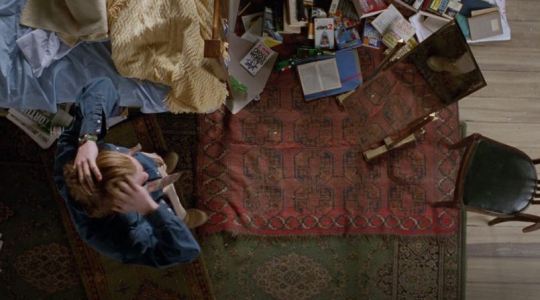
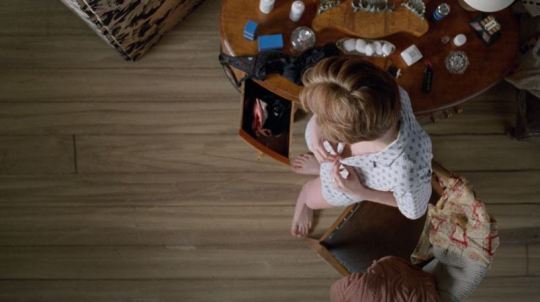
This scene simultaneously offers us a leveling effect between the two objects of David’s gaze (Alex and Juliet), while simultaneously prioritizing the heterosexual coupling. However, the implication that there is shame associated with the heterosexual gaze, complicates the situation.
Penetration with the Drill (Phallus)
When Alex goes into the attic to look for the money (and finds it in the water tank), he climbs back down the ladder only to be confronted by David, who is holding a drill (phallus) as a weapon. Alex’s hands are wet from the water, and he frantically wipes them on the seat of his pants, behind his back, visually placing his hands as a barrier to his anus. The Drill makes contact with Alex's head and breaks the skin in an act of penetration (the body barrier is broken). This is the first scene in which David directly engages in domination (and penetration) of Alex.
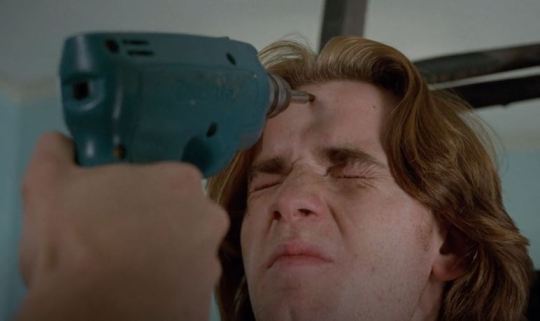
David’s Glasses and Alex’s Photo
Lenses, mirrors, and portals/doorways are deeply significant visual aids in this movie, but I want to highlight the one that stood out to me the most. When Juliet and David have (implied) sex, at which point they solidify their status as a couple, David removes his glasses, and places them on Juliet’s bedside table. Underneath the glasses is a photo of Alex in costume, a cigar in his mouth, framed through the lens of the glasses. The photo was taken on the day in which we see Alex at his most feminine, at a point where he had been thoroughly emasculated (beaten in a bathroom by a man that he had emasculated multiple times). The framing of the photo, through the lens of David’s glasses implies that this is how David sees Alex – costumed, emasculated, and with a phallus in his mouth.
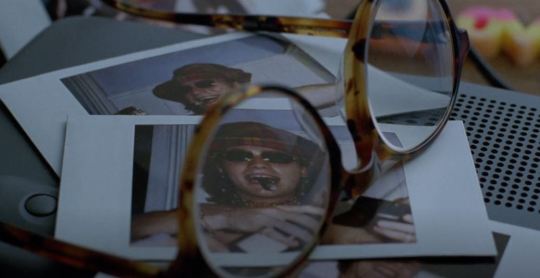
This photo is also shown once more in the film; David holds the photo of Alex as he lies in his attic bed, and he pins it above his head so he can look at it. The scene cuts to Alex, also in bed, who then gets up. It once again cuts back to David, who also gets up, and we see that Juliet lies asleep next to him. This follows a pattern of shots that we’ve seen before in the film (see the Surveillance section), where we see David watching Alex in what could be interpreted as a sexual or romantic way, before the camera reveals Juliet and lingers significantly. The implication is that whatever there is between David and Alex always gives way to the relationship between David and Juliet.
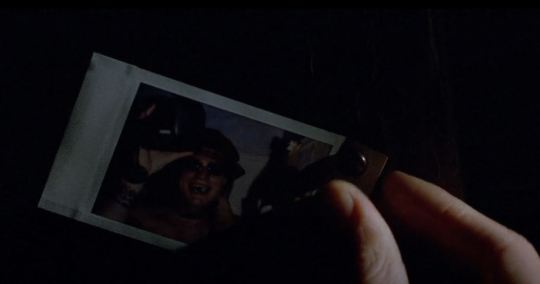
Returning to the glasses - the final time that we see them is during the climax of the movie. The three characters are struggling against one another, and David’s head is forced into the refrigerator so that Alex can try and smash him with the door. He manages to throw Alex off, but not before his glasses are caught on the shelf of the refrigerator, thus knocking them off his face. Having David’s glasses be knocked off would not typically be significant in a fight scene such as this, however the camera goes out of its way to linger on this shot, indicating that the symbolism here is important. The other time that we have seen David remove his glasses has been before he has (implied) sex with Juliet. In this case, the removal of the glasses occurs just before David pins Alex in his final act of domination, which then culminates in the ultimate symbolic act of sexual penetration – David stabbing Alex with a knife (phallus).
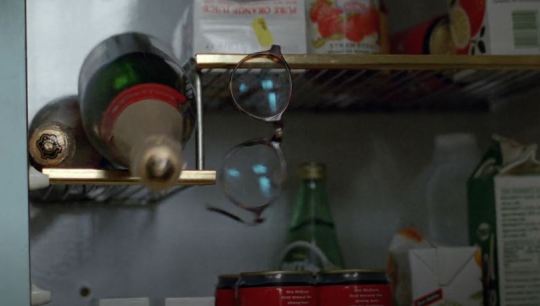
NOTE: David is also pictured without glasses at the beginning of the film, where he is lying on his back, and halfway through the film, after he has dismembered Hugo in a symbolic act of violence against his own vulnerability. In the first scene we hear his monologue; “I’m not ashamed, I’ve known love, I’ve known rejection. I’m not afraid to declare my feelings. Take trust for instance, or friendship. These are the important things in life. These are the things that matter, that help you on your way. If you can’t trust your friends well, then what then? What then? This could have been any city, but all the same.” It is unclear until the end, but it seems that the first time that we see David, right at the beginning, we are actually seeing him postmortem in the morgue. Meaning that the monologue is a lament on his life... (You're not ashamed of what, David? Being a bit gay, perhaps?)
Penetration with the Knife (Phallus)
At the climax of the movie, after David’s glasses have been removed, we arrive at David’s final act of domination over Alex. David pins Alex to the floor by sitting on his stomach, with Alex’s legs pinned underneath his knees in a position that could be interpreted as sexual. He then holds Alex by the throat, and stabs him in the shoulder, slicing clean through and penetrating the floor. The act of stabbing (penetrating) a victim with a knife (phallus) is one often noted in analysis of horror films, as having sexual implications (again – I’d find some article about it here if I was a serious writer lol).
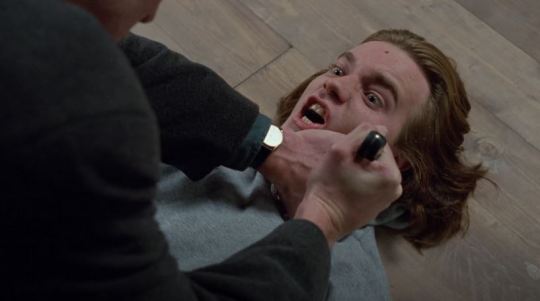
Before David can stab Alex again with a second knife, David is stabbed with a knife through the throat from behind by Juliet. Thus Juliet, who has been a dominant character throughout the movie, is symbolically penetrating David with a phallus. Furthermore, the location of the stabbing in the throat and from behind, implies that David has now suffered, once again, an emasculation, just as he had just preformed on Alex.
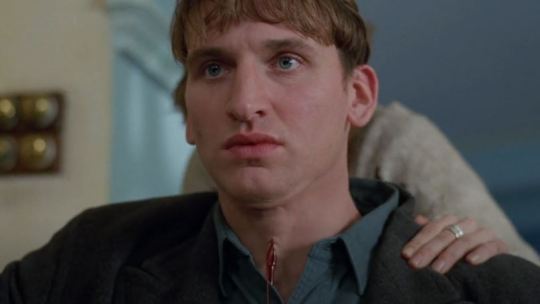
David collapses and dies, just as Hugo did, from emasculation through the body barrier being broken from penetration. Thus, David’s identification with Hugo’s corpse and the vulnerability that it represented, is complete in this moment.
Juliet then kneels over Alex, taking up the same position that David had just occupied, and places her hand on the knife in Alex’s shoulder, pressing on it, thus taking David’s place as the one to dominate Alex. She then removes her shoe, and in an act that mirrors the scene from the charity ball in which she dominated Alex by having him lick her shoe/foot, she uses her shoe to hit the knife three times, driving it deeper into his shoulder, further penetrating him. Thus, in her final interaction with both David, and Alex, she has penetrated them.
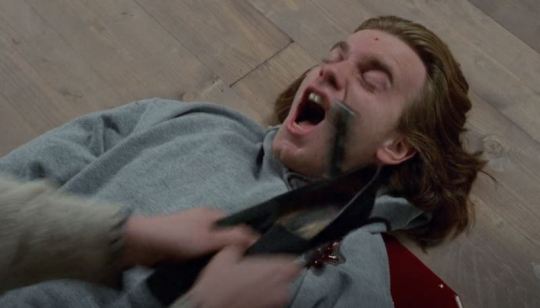
As she puts her shoe back on, we can see inside of the refrigerator, where we once again see David’s glasses, recalling once again that this scene is coded as sexual in nature through the movie's visual language.
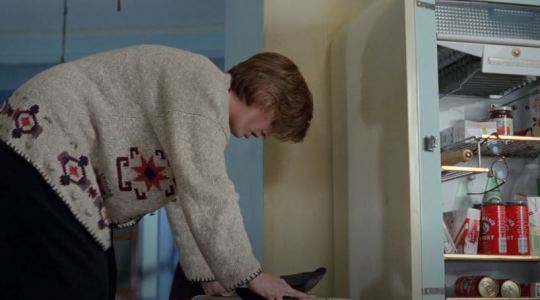
As the movie closes, we discover that Alex is alive (probably), and that he has hidden the money underneath the floorboard. In the ultimate irony of the movie, the character that spent the second half of the movie being coded as the submissive (homosexual receiving) partner, has come out on top, despite the other two character’s attempt to dominate (and kill) him.
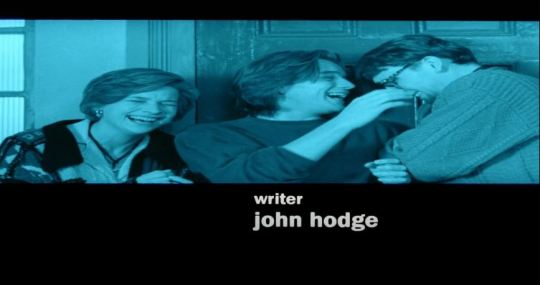
Uhhh the credits roll, and they're all shown as they were in the first scene of the movie, smiling, laughing, and the love song "Happy Heart" plays...
#shallow grave#ewan mcgregor#i can't believe i wrote 7 pages of this#lmfao#this is for you loycspotting#cw: blood#CW: stabbing#cw: nudity#cw: murder
113 notes
·
View notes
Note
Feyd Rautha headcanons plsss
Like what was his upbringing and training like? How did he become what he is?
Okay I think about this A LOT and I just wanna say that I know people argue a ton about the original Dune book(s) vs the older adaptations vs the new DV movies, and these are just my thoughts! Frank Herbert was a great writer and he gave us complex characters with tons of subtext, but the original Dune was also published in the 60s and the other best known older adaptation is from the 80s, and both have some definitely outdated and not great stuff was used to show how bad a character was (like the Baron having an affinity for uh young boys who look like Paul 😬). I think that DV made some really smart changes to these characters that are more in line with contemporary thinking, while also remaining true to what Frank Herbert was trying to tell us about them—like the Baron is a Bad Man and Feyd is angry and impatient and definitely wants to kill him. ANYWAYS leggo, this is long and my thoughts jump around a lot but I hope you enjoy!
WARNING for some talk of SA! Also mentions of violence and murder and cannibalism, the usual stuff
The more serious ideas that are backed up by text and movie evidence:
Feyd-Rautha was taken from Lankiveil, a Harkonnen planet ruled by his birth father Abulurd (Vladimir’s younger half brother) by his uncle, Baron Vladimir. Feyd definitely knows this, and knows that Glossu Rabban is his older brother…so imagine all of the conflicting thoughts he must have surrounding his own position and future. On the one hand, he was taken and raised by his uncle so that he could inherit the title of Baron. On the other hand, he was taken as a punishment to his father. There must be resentment there, towards both his father and his uncle, and even his older brother. Even though Feyd was essentially chosen to become something more than Rabban, he grew up away from most of his immediate family. Even though he was raised to become Harkonnen royalty, imagine how he might have turned out if he had remained with his father, who had renounced the Harkonnen name.
He was brought up in a cruel and harsh environment. He was made into a killing machine, partly because of Harkonnen customs, partly because Vladimir enjoyed the carnage, and partly because it was the only thing a young Feyd ever knew. As a young man, he loves killing and shredding because it feels natural and is second nature to him, but does he ever wish he had known what it was like growing up in a softer environment? Food for thought.
He hates his uncle. In the book, he attempts an assassination. In DV’s part two, he mentions to the Baron that he should kill him, and the Baron laughs. Vladimir finds it amusing that Feyd would say something like that, because he knows he’s got Feyd under his thumb. Perhaps Feyd is even scared of him.
The Baron is, and was, cruel to him. In the book, after the failed assassination attempt, Vladimir tells his nephew that if he agrees to stop trying to kill him (lol), he’ll step down and let Feyd have his position. BUT he kills his darlings as a punishment (who in the book are female slaves, who act as his lovers)
I already have a ton of headcanons about his darlings in the DV movies, and I really think that Feyd cared for them. So imagine that your own uncle WHO YOU WANT TO KILL takes away the only things you care about?? That’s fucked up man
The Baron abused Feyd to some degree, very possibly sexually—I’ve seen a lot of people pointing out how heavily this is implied by the subtext in both the book and part two. Feyd is actually a complex character, but neither Frank Herbert nor DV really spelled that out, and you have to dig a little and think about it. While I obviously don’t want ANYBODY, even fictional characters, to experience something like SA, I think it does add to the depth of his character and gives more fuel to his rage. It also shows us just how terrible Vladimir really is. I’ve seen it suggested that this is part of what Margot Fenring means when she says that Feyd is sexually vulnerable, but I take that comment to more mean that he opens himself up to the possibility of harm a LOT in bed and that’s when he’s most emotionally vulnerable. BUT I don’t think those things are mutually exclusive
NOW THE MORE FUN IDEAS THAT I ENJOY (fun is a subjective term here lol)
Feyd-Rautha has a vulnerable side, and it’s very, very guarded. It’s buried so deep he may not even be aware of it.
He really does care for his darlings, and that’s the closest thing he feels to love. It’s a possessive, ownership kind of love that we would consider toxic irl, but they’re the only things besides his weapons and power that he cares about.
He doesn’t revere his weapons, but he respects them. They’re not personified, but he appreciates a good killing tool, and likes to take care of his knives.
He views lives as very black and white. There are people who can be killed (slaves, servants, rivals, his uncle), and people who ABSOLUTELY cannot be (his darlings, an SO, his hypothetical children)
He views everyone else as weaker than him, and it’s partially because his uncle would never LET someone as important to his plans as Feyd be harmed, so Feyd rarely feels that his life is actually in danger. Almost everyone he fights in the arena is drugged, and it isn’t like his trainer would fight without shields. He’d be confused and intrigued by someone who could actually defeat him, and he’s so into the art of war and battle that he would respect it (but also be upsetti)
He spends a lot of time watching and calculating in silence. While he’s impatient and has a short temper, he likes to learn about things that interest him.
He’s up to date on Giedi Prime beauty trends and sets a lot of the standards himself. He gets massages and spa treatments regularly and has been known to undergo more serious procedures.
While he doesn’t partake as regularly as his darlings, he occasionally consumes human flesh and blood and doesn’t think it’s weird, because he views almost everyone as lesser than him, so eating them is akin to eating livestock. Alternatively, I could see him going down the “I feel so overwhelmingly deeply about you that I must consume you body and soul” road about someone special but I really don’t think he’s got that brand of romance in him lol
Like lady fenring said, he is, in fact, sexually vulnerable. In the bedroom, he can let out his emotions, and sometimes they’re ugly and sometimes he needs to not be in charge for the night. He leaves himself open to manipulation and harm. Man just really needs a good hug tbh
Canonically hypersexual as a result of trauma
Is harsh as a result of a harsh upbringing, one that looked comfortable from the outside but was anything BUT for him. Beneath the surface, he’s messy.
Aggressive because he’s always had to be to survive. His uncle probably wouldn’t have killed him because he was always integral to Vladimir’s plans, but did a young Feyd know that?? NO
is NOT well traveled. He’s lived on Giedi Prime his whole life, has probably seen Lankiveil, which is cold and watery, and has been on Arrakis, but I think he would NOT know what to do if he was on a lush green planet. All he knows is harsh, extreme environments. If you plop him down in a meadow, he will have NO clue what to do
As a child, he watched his uncle kill anyone who inconvenienced him. This definitely warped Feyd’s concepts of kindness and the value of life.
His childhood was just unbelievably strict and harsh and at the same time he was spoiled in certain ways, and that has led to him growing into a pampered yet still caged man
He would LOVE to slaughter his uncle and feed him to his darlings
In an arranged marriage, something about his spouse would have to suddenly intrigue him, and then he would be HOOKED. He would sink his teeth in and refuse to let go. Opening up to someone who isn’t one of his darlings would be strange and difficult for him
Remember how I said he isn’t used to fighting sober opponents? I think that once he gets a taste for fair fights, he becomes a little addicted to the thrill of it and the power that those victories bring him, and he loses interested in drugged fights. After a lifetime of living under this uncle’s thumb, the control he has over someone’s life and PROVING that he’s better and stronger and meaner than them is the most validating feeling he knows.
He never shows mercy, because no one has ever showed it to him.
254 notes
·
View notes
Text
Alhaitham referring to kaveh in ways which acknowledge his skill, and kaveh perceiving it as sarcasm, even though alhaitham refers to kaveh in the same ways when kaveh isn’t present is driving me a little bit insane - especially what this prompts the player to question!!
When we first meet kaveh in the archon quest the relationship between him and alhaitham is presented to us as “terrible” (courtesy of npc geoff who introduces kaveh’s return to sumeru city), and the cutscene in the house of daena demonstrates what this entails, being that the two cannot see eye to eye, and, seemingly don’t hold each other in high regard.
Alhaitham seemingly refers to kaveh’s genius in a sarcastic light and kaveh claims to despise talking to alhaitham because of his arrogance.
Looking to kaveh’s hangout, however, when the player has a one-on-one with alhaitham, the player gets a glimpse into alhaitham’s personal understanding of kaveh, and with this, his own views on kaveh.
Within this exchange between him and the player, Alhaitham uses Kaveh’s title without sarcasm, sincerely praising him and his skills, elevating him over ‘less skilled’ architects and asserting that Kaveh should have more confidence in his work.
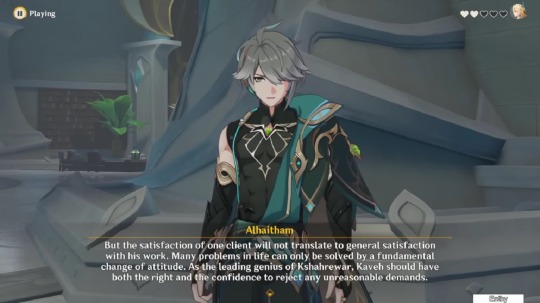

The reason that Alhaitham does not openly praise Kaveh is stated here, being that “admonitions” will serve no purpose due to people being prone to fall into “similar pitfalls”, and that people should have the right to lead their own life, rather than have it interfered upon by others
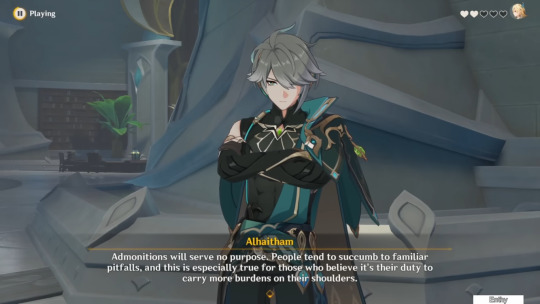
The reading here is that even if Alhaitham did openly praise Kaveh, no difference would be made in Kaveh’s thinking. Yet, by refraining from praise, and instead goading, by this logic, this also makes no difference. Therefore, the question is raised, ‘why can Alhaitham praise Kaveh to the player, and not to Kaveh himself?’
When Alhaitham praises Kaveh’s work within Kaveh’s hangout it is through there being no record of issues in the reconstruction of port ormos, which is something kaveh states first - in this context, alhaitham notes the work as an “impressive achievement”, which kaveh assents to, as there is no standing in which this can be debated. Kaveh cannot resent a compliment steeped in fact, even from alhaitham



The problem, then, is rooted in alhaitham’s delivery, which relates to their core issue of miscommunication. Referring back to their exchange in the House of Daena, it is observed that Alhaitham uses similar descriptors of Kaveh to Kaveh, similar to the descriptors he uses to the Traveler in Kaveh’s hangout, however, Kaveh perceives these words as sarcasm.
This highlights the miscommunication between them and can aid in answering the question why Alhaitham cannot be open with Kaveh, as he will be misconstrued.
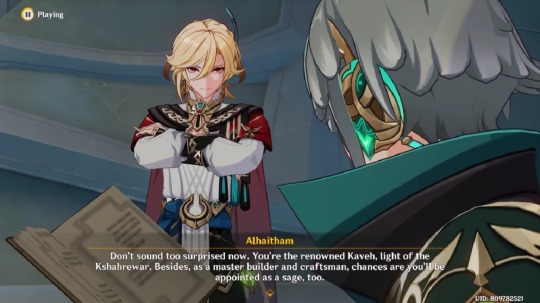
Through Alhaitham’s repeated elusions to Kaveh when he is not present and his open esteem of Kaveh and his work to the Traveler, Kaveh’s assertion that Alhaitham holds him in a negative light is proved incorrect. This serves to highlight the miscommunication between the two, causing the player to question why they hold such contrasting views of the other.
Clearly, there is a reason why Alhaitham cannot openly express his regard of Kaveh to Kaveh, but this reason is obscure to both kaveh and the player.
In terms of queer subtext it’s pretty interesting that alhaitham’s high regard for kaveh is shown within the surface text and yet the reason for this secrecy is never made explicit within the story’s surface and is only to be inferred from alhaitham’s and kaveh’s character stories.
In terms of the two functioning as mirrors, the fact that the knowledge that alhaitham cannot outright compliment kaveh 1) is not only due to their past argument and lost friendship and 2) is also due to his awareness that kaveh cannot accept goodwill, is only obtainable by reading both kaveh and alhaitham’s character stories shows how intertwined they are as characters - you cannot fully understand one without the other
(Update: For more analyses like this, the essay this is taken from is now uploaded! It can be accessed here and here as as a pdf <3)
#haikaveh#kavehtham#kavetham#alhaitham#kaveh#okay i think my thoughts got derailed in the end but pretend they didnt#some of this is from the essay and you can probably tell because of writing quality#but i think it is so interesting that what alhaitham chooses to share with the player clearly highlights his regard and respect for kaveh#but his reason for hiding it from kaveh has to be inferred by digging into their lore#and when you realise that alhaitham doesnt want to cause a repeat of their past argument by encroaching on kaveh’s fortified boundaries#it only shows how MUCH alhaitham cares about him#im sick!!!#they make me sick!!!#and also that part in kaveh’s hangout when kaveh says he’s so used to sarcasm he cant tell what genuine praise sounds like#my boys#you need to talk#I AM BEGGING!!!!
265 notes
·
View notes
Text
People talk about some of the homophobic elements of grindeldore and I have thoughts
Firstly I don’t agree that gay Dumbledore was tacked on. I think JKRs mistake wasn’t making it explicit enough. However it is defo in the subtext, the way the relationship is talked about is implied to be romantic. But it’s not enough and it goes over a lot of people’s heads.
Now I will give jkr the benefit of the doubt. It was 2007. Gay characters in mainstream tv were rare and that’s just for adults. It’s likely that a full on explicit gay old man in a child’s book would have been shot down. Also people say she announced it when in reality she answered a question from fan. It wasn’t a big fanfare like people suggest. Dumbledore was always gay. Should have been explicit yes but it was never for woke points. (And like do you really think jkr would want woke points especially in this day and age)
Now fantastic beasts I think it’s mostly fine. I do think Yates is a complete moron for saying they wouldn’t show Dumbledores sexuality explicitly. Like come on dude it’s about grindelwald that relationship is so important to him as a character and fans have wanted it explicitly for a long time. Idk why he even said that.
I think COG is a bad movie and Johnny Depp sucks as Grindelwald. The gay stuff is okay. Like it is shown. That mirror scene is explicit. Look at this and tell me this isn’t meant to be romantic.

I do think it could have been spoken about more. I mean grindeldore should have intersected a bit, but fully think they don’t because Johnny and Jude likely didn’t have chemistry. It’s not perfect but it’s a far cry from queerbaiting.
Now secrets of Dumbledore is just explicit it’s a major part of the plot. Grindelwald and Dumbledore both speak on the relationship, grindeldore clearly pine. There’s no way you can think it’d too subtle. Now I do think flashback should have happened in SOD, like just narratively we need to know what that relationship was like and I think we could have had physical intimacy here. Maybe they were waiting for the next films but I don’t get it. Like come on Toby and Jamie are great actors and we should know how passionate it was! Apart from that I have no complaints on SOD.
Overall I think fantastic beasts is okay. Should have been more but I don’t think it was terrible. I mean I just wish they did a grindeldore story from the jump, but a last.
Now let’s get to the meat of this. I think that JKRs original idea of Gellert just manipulating Albus is homophobic. Like yes Gellert is a horrible person, and manipulative however having your only queer relationship be based on lies is kinda horrible? Like what message does that send to queer people, that your love is fake? . That sad gay Albus was taken advantage off by BAD gay Gellert.
Now mutual grindeldore is better, gives Gellert a better villain narrative for fb plus its now an actual relationship ripped apart by Gellert’s character flaws. It’s an queer relationship with two gay men invested in each other. Gellert is no longer just a unfeeling seductive bad GAY. But an actual gay man who feel in love just like Albus.
Is there still issues with mutual grindeldore? Hmmm I think there is an implication in the text that it was bad for Albus to fall in love. That there is idk a punishment for him loving man. That if he didn’t love Gellert ariana would be alive. Which I don’t really like that implication for the only queer couple. Like yes Gellert is the bad guy. Yes their ideas were fucking horrible, however Albus was not in the wrong for being idk young and in love. I t don’t really like that Jkr refers to Gellert as Albus dark temptation either. Just…ick.
As for Albus not loving again. I don’t think that’s bad. I think that’s understandable. Gellert was his only equal and Albus doesn’t think he’s worthy. This isn’t exclusive to them. Snape is the same, he never moved on from Lily, here I think this is just a theme of the books, only loving once. Now I do think it’s odd that Jkr refers to him as asexual after (not what asexual means btw Joanne) like okay does he just think sex is bad now?
So yeah I think a couple of elements of grindeldore that are a bit icky. I do love them and find their relationship the most interesting in the canon. But just some of it is a little hmmmm.
I do also think their is strength in gay Dumbledore. A feminine gay man who isn’t mocked by the narrative who’s complex and powerful. Also he’s old! Old gay men aren’t in many stories.
Gellert is interesting too (but ngl I give this mainly to mads who plays him with nuance) a gay villain who’s threatening unrelated to his sexuality. Also complex. Him wearing queer symbols in fb is also cool.
Also find it cool how close their love story is to the arrest of Oscar Wilde.
All in all grindeldore and Dumbledore is not perfect rep. It should have been more open in the books. In both fb and DH. There also should have been a couple more queer characters in fb. I think that would balance it out (I get why there isn’t in hp, again 2007) but I don’t think it’d dripping with homophobia like some suggest.
Also off topic but why did Rowling deny Sirius could have been queer so hard??? Like I get she didn’t want wolfstar (that’s fine btw) but like she was so angry about it lol.
#harry potter#grindeldore#some musings#again some only see negatives when Albus queerness is easy to explore#but yeah it was never tacted on
11 notes
·
View notes
Text
Food and Nurture 2: Melons
Every Eva fan knows Kaji grows watermelons. But what if a watermelon was also a metaphor for family? This week on Food and Nurture: Melons for Misato (or; Why a sexually aggressive drifter represents the Hope of Familial Love.) Heads up - this one is long and a bit of a ramble, and the footnotes include a brief discussion of depression.
Kaji’s association with the nurturing role in Evangelion is pretty clearcut, and it even has a core motif: His melon patch. The first time we see it is in Episode 17 of the series, placing it right after Shinji’s experience inside Leliel (which will have a post some time) and its commentary on depression, and right before the Bardiel horror-show. So contextually, this is Shinji on the upswing of one of those strange depressive episodes that are both traumatic and cathartic, at the end of which he – I think quite genuinely – says he’s feeling fine now.* Enter Kaji taking him to see the melons, though not without a stop for a can of tea first where there's some important dialogue:


(The ADV dub here plays up Kaji's flippancy - his response is instead 'You're saying that to someone as straight arrow and reliable as me, Mr. Ikari?' It's one of their bigger departures, but as is often the case with Kaji's lines, it works.)
This, I think, tells us we should put great stock in the scene that follows in a fairly blunt way: Kaji is asserting that he is not, in fact, a purely flippant fuckboy spy, but a human being - one who, contextually, understands what it's like to be in pain but has fought his way to a place where he's able to keep it from being his only understanding of the world. The way he does that is through nurturing plants, and by extension, others. That’s text, but the particular choice of plant gives us a wealth of subtext to look at.
The melon is, as I understand it, a historical symbol of luxury and prosperity in Japan – though I must emphasize I’m not Japanese and, unfortunately, can’t read Japanese texts, so I wouldn’t put too much reliance on what I’m saying here. I don’t just mean the more modern culture of the Luxury Melon, as fun as that can be to look at, but also an older tendency that helped pave the way for the modern one. This makes sense, since that’s the case for, well, most fruits in human history – they’re delicious, they’re seasonal, they only grow in the right places, and unless you live in those places, getting one is a treat until pretty recently. But the melons, in Japan, became one of the iconic Gift Fruits, and I think that produces an interesting subtext here, because it means Kaji’s growing a small luxury that makes a great gift.
He could grow anything he wants – if he wants a plot of cabbages or leeks, he could do those. He’s chosen melons. Just as significantly, he’s growing them inside the Geofront. Kaji has chosen to grow gifts of luxury and joy in the middle of what he knows is a battlefield, and even – in the series – to go out there and water it during an active battle that probably should kill him. His dialogue during the scene in Episode 19 about that is iconic:
(The default text is the old Platinum subtitles, with subsequent text marked out to show if its from Netflix’s ‘more accurate’ subs or dubs (NF-S/NF-D) or the ADV Dub (Dub), though I’ve only included those where I think there’s something interesting. A | in a line indicates that the prior dialogue is the same or close to the same, and everything after diverges between translations.)
Kaji: Well, if it isn’t Shinji!
Shinji: Mr. Kaji? What are you doing here?
K: That’s my line! What are -you- doing here?
S: I… I’m never going to pilot an Eva again. And since I decided that…
K: I see. Well, since my moonlighting came out into the open, I’m not welcome on the combat roster.

So, here I am – watering the plants./So here I am, sprinkling. (Dub)/I’ve been stuck watering my plants ever since. (NF-S)
S: At a time like this?
K: It’s because it’s a time like this./What better time? (Dub)
Between Katsuragi’s breasts is nice too, but in the end, I want to be here when I die./Although I’d rather be between Misato’s melons, this is the place I’d like to be when I die. (Dub)*
S: Die?
K: [Kaji explains the whole ‘Angels + Adam = Third Impact’ problem and how only an Eva can stop it, while Rei tries and fails to do so.]
[The two experience an N2 mine going off right near them, but not near enough to damage the garden. We don’t see Kaji’s reaction but do see Shinji brace against the winds and heat, which is a nice touch that lets us imagine Kaji ignoring it completely to keep watering without the silliness of illustrating that. Shinji is facing away for the remaining dialogue, staring at the remains of Unit-00 and Unit-02, and to a degree Kaji is almost talking to himself.]
K: Shinji, the only thing I can do is stand here and water. But you?
You have something that you can do, that only you can do.
Nobody is forcing you.
Think for yourself, and make the decision by yourself.
Think about what you ought to do now…
You know, so you don’t have any regrets./Think about no longer having any regrets.(Dub)/So you don’t have any regrets later, you know? (NF)
(It’s subjective but I do think the lines ADV gave him here are perfect for the character, in that he’s flippantly dismissing things – with the line about Misato, its with a sexualized joke that conceals a deep sincerity, while with his sardonic ‘sprinkling’ he’s very clearly poking fun at himself.)
Taken as a whole, that’s some solid dialogue! A bit infodumpy in the middle where I clipped it, but solid. And when we look at it in the context of the theme we’re unpicked here, Kaji’s dialogue is as much with himself as with Shinji. He can’t fight, but he can do something that matters – two somethings, in fact. One he achieves, which is to nurture living things even when it looks like the world is about to end (which gets turned into outright text in the rebuilds in a big way – more on that later), and the other… The other, he unfortunately, fails at. It hinges on the last line. What should he do in that moment so he has no regrets?
Tell Misato he loves her. Say the words. Call her and say them, even if she doesn’t hear them until after, if ever, because at least he can die knowing he said them.
But Kaji isn’t capable of doing that, for whatever reason.** So he goes on sprinkling and being flippant, and has a win in motivating Shinji to avoid the pain he himself feels in that moment. As he says himself: ‘the only thing I can do is stand here and water’, though he could in fact take out his phone and call Katsuragi - the same way Katsuragi called him on it in Episode 17. And yes, the lines are probably down, and she's busy, and on and on and on go the possible excuses, but the symbolism of the two scenes is what matters here, since they're close mirrors - in both, it's twilight; in 17, Shinji is on the way Up, in 19, he is firmly on the way Down, in both, Shinji's off to the left and Kaji's off to the right. But in 17, Misato reaches out to Kaji... and in 19, as he speaks of regrets, he can't reach out to her.
Instead, all he can do is stand there and water those melons – the same ones that he explicitly links to Katsuragi. Water those expensive, luxurious gifts so that he can give them to her – quite expressly as a surprise, since he asks Shinji not to tell anyone about the garden the first time he shares it with him. He can't bring himself to reach out to her, but he can stand there and stubbornly keep the dream he's nurturing of creating a family with her and Shinji alive. When he finally does call her right before his death in Episode 21, he creates another link between the garden and the words he cannot find the courage to say:
K: …Also, since I’ve troubled you so much anyway, there’s this flower*** I’ve been growing. It’d make me happy if you’d water it for me. Shinji knows where it is. Katsuragi, the truth is with you – go forward without any hesitation. If I ever get to see you again, I’ll say those words I wasn’t able to say eight years ago.
This repeats the same structure of thought: ‘I have a garden, and it matters. > Shinji’s in the mix, and so is how we should live as human beings. > I know I’m about to die and I wish I was strong enough to say I love you, but I’m not, and I am filled with regret and shame about that.’
If we return to the introduction of the melons, the groundwork for this is laid out for us when Kaji lays out a crucial part of the entire thesis statement of Evangelion for Shinji:
K: Making something, nurturing something, is really great.
You can see and learn so many things from the process| – like what’s enjoyable./| It also brings pleasure. (Dub)
S: And about suffering too, right?
K: Do you… hate suffering?
S: I don’t like it. (I mean yeah fair enough bud that’s kind of what makes suffering suffering)
K: Have you found anything you do enjoy?
[silence]
That’s fine too – but knowledge of suffering makes you all the more capable of kindness to others. Because that’s [being kind] different from being weak.
That’s really what the underlying thesis boils down to: Suffering isn’t great, but finding the things that give you joy – and those things will involve human connection, which is at its best when its kind – is worthwhile despite the risk of pain. And there’s Kaji just casually dumping it on Shinji like some kind of dysfunctional monk. But again, we can look a little closer and drill into the specific character dynamic on display.
Kaji, we may safely assume, has experienced a great deal of suffering – some of it at Misato’s hands during their breakup, since she created the illusion of emotional infidelity to drive him away – and has chosen to nurture living things as a way of processing it. Here, he’s sharing that practice with Shinji and explaining why he does it. He knows Shinji’s just come out of a major depressive episode, and this is him trying to hand a young man he hopes to be a father to a tool with which to keep himself from going back to that place. This is him saying ‘you are worthy of love, because you can choose to be worthy of love by nurturing things. That’s what makes a great man.’ He may even have noticed that Shinji, though he has the capacity for kindness, is torn between it and a reflexive rage at a world that both hurts him and that celebrates his capacity for violence - and rather than let that play out unhindered, he's taken him somewhere to remind him of the importance of gentleness and care.
When we look at it through this lens, Kaji’s melons aren’t just ‘gardening is a nice hobby that teaches you about life’. Kaji’s melons are his own personal hope of redemption and restoration to being worthy of love. They’re the way he’s going to create a family, and the proof to himself that he is actually deserving of having one, and he’s brought Shinji to share in that wish as essentially a piece of ersatz fatherly bonding and advice, because Shinji is Misato’s ersatz son and so he becomes Kaji’s ersatz son in turn in his dream of family. Even his desire to be there among the melons when he dies is a sublimation of the impossible actual wish – to be with Misato and, contextually, Shinji (and maybe Asuka) when they all die – that hinges on being a man worthy of love and kindness, of family.****
Briefly, on Asuka - other people have already written about Asuka as a kind of red-headed stepchild (specifically Rei-Mary, here), and I think it’s safe to say her presence in his imaginary family is a tricky one – one I’ll go into in another post some time if life permits. The short version: Kaji doesn’t actually know how to navigate Asuka’s behaviours towards him or her despair, so he sort of… gives up, unfortunately. She isn’t necessarily out of the potential picture, but the focus of his scenes and nurture are very much transferred to Misato and Shinji once he arrives in Japan, and he quite actively pushes Asuka away. And honestly… That’s not necessarily a terrible decision, even if it isn’t a perfect one, because Asuka is projecting some very unhealthy things onto him that, if he doesn’t navigate them very carefully, are going to cause serious psychological damage to everyone involved. The execution of his withdrawal ends up inflicting a different kind of harm, but as an instinct, I can’t fault ‘No, I probably shouldn’t spend a lot of one-on-one time with an emotionally traumatized and unevenly developed teenager who exposed herself to me and continues to have serious boundary issues’. However, not modifying that instinct when she’s part of an existing ersatz family with the one you want to start one up from is pretty shitty, so that's another one for the 'adults who did Asuka wrong' list.
In any case – back to melons. The Rebuilds take this same theme and run with it, though in a way that at once strips away subtext and then refuses to make it text until it’s suddenly background context. There’s probably a metaphor to be drawn in there about the Rebuilds as a whole, but rather than digress onto that… Kaji in the Rebuilds has a very explicit connection with the use of food and gardening as a means of connecting with and nurturing others, and even with Connection as a general motif – in fact, the first time Shinji sees him, he’s standing in front of a transit line map (a very literal map of connections):

This isn’t his first appearance, as he’s there during the whole Bethany Base intro. Unlike the usual case where introducing Mari throws off the order of scenes, this shot of him is something added in for 2.22, so this was never going to be his actual first appearance either way. It’s a bit of a weird scene either way, for reasons I go into down in the notes,***** but it does highlight just how central the motif of connection is with Kaji's character in the rebuilds.
His melon patch motif returns from the series, but he also gives the all-important field trip of the oceanic restoration project, which I’m going to call the Unforgettable Luncheon because I can, and which I’ve shoved into its own post since this one’s getting way too long as is. 2.0 reprises the Melon Patch scene - it begins with Kaji jokingly hitting on Shinji (ah, there’s the sexually aggressive and poorly shaven drifter I know and love!) and buying his time with a can of coffee. (Yes, we’ll get to the coffee soon… in another post.) in a scene that again seems to play with the right-left dynamic, then cuts to the melon patch. Its pretty well identical to the one in Episode 17* except it isn’t set at twilight, but in the day, and Kaji has a sign. His garden isn’t secret, and he asks Shinji to take care of Misato, since only he can. This scene was, in the storyboards, placed right after the Fucked Up Dinner from part 1 of these posts, creating a tighter narrative through-line that Mari disrupts by parachuting in.
This is, on a subjective level, a huge misstep in the Rebuild - both breaking the through-line between the FUD and the Melon Party, and compressing the two Melon Scenes into one. The Kaji Dialogues during them work best as a duology, and here, they’re compressed so Mari can take over the second… But by doing so, we lose Kaji’s regrets over never telling Misato he loves her, and the tragedy that he never will. The melons remain a general metaphor for personal growth but lose the bittersweet personal metaphor. That extends on through where the melon patch’s second appearance is to be blasted by the N2 warhead with Shinji falling among them, which creates a connection to the first dialogue and the request to protect Misato, but not to the heavy air of gentle sorrow that hangs over Kaji’s dialogue in 19 as the world ends in front of him and he remains a coward. In part, that fits with the decision to more-or-less sideline Kaji… But then the choice to place him at the heart of 3.0+1.0 undercuts that decision in turn! It’s quite infuriating, but at least it produces a segue to 3.0+1.0 where the subtext becomes text and loses its magic.
The melons only play a background role in 3.0+1.0. They appear in the redraw sequence of Kaji with Kaworu that we see during Instrumentality, with an explicit invitation to ‘work the fields with me and Katsuragi’- repeating the motif of Kaji seeking to create a family unit through the melons. The other is as a life’s work – the grand evacuation of seeds and embryos from earth via the Wunder was his plan, and it’s… an interesting interpretation and clear marker of the difference in what we could say Kaji’s Will is between both films and series, though not one I personally like.
Still, there’s something to be said about his lasting legacy here: where NERV built battleships to erase humanity, Kaji stole one to keep everything else alive. That’s not a bad goal, and its refreshing to see a character who outright rejects anthropocentrism, but it doesn’t feel earned. It’s the same problem that hangs over Kaji as the ghost haunting 3.0+1.0 – he… isn’t, really. It’s like they remembered ‘oh yeah! Kaji!’ and threw him in the blender with everything else to wrap up the quadrilogy with. It doesn’t cohere. It’s nice seeing his personal watermelon seeds are going to be saved:

But is it earned? Not really. Does it carry the same weight as the melon-as-hope-of-family? No – no it does not… and in that sense, it’s made all the sadder, because Kaji and Misato have a son in 3.0+1.0 but there is no family there. Like the watermelon seeds, Kaji Junior is hermetically sealed off from connection to that motif that was so sweetly layered into the series. We’re now firmly into the territory of personal opinion, but placing watermelons in the mix would have been a way to create a greater sense that rather than being forgotten, Kaji’s ghost haunts 3.33 and 3.0+1.0 in a way that makes the pain of his absence undeniable for Misato, without having to come right out and shout it at the audience as 3.0+1.0 does. Just a few melons being picked or eaten during the farming montage in the village in 3.0+1.0; a slice of it in the otherwise sterile food served on the Wunder in 3.33. The Melons were a symbolic thread that was brutally cut and then, very crudely, spliced back together for the finale – and it didn’t need to be cut in the first place.
That’s not the cheeriest place to leave off, but such is life. I’ve still got to do the one about Kaji and Coffee, the Unforgettable Luncheon, Rei’s Farm Life Montage, and another big one, the Asuka-Food Nexus in both series and films. Plus, that one Ramen scene that tells us that Original Rei knows what’s up, that Asuka definitely has a heart, and that Misato's credit card debts must be through the roof. And of course... what does Misato's diet of microwave cookery tell us about her inability to construct a healthy family life?
*: And he will be. For a while. I have a good dose of double depression – a Tumblr user with depression? Unheard of, right? – and that’s a pattern I recognize. You sit for a while in a generalized dysthymic state that doesn’t quite destroy your ability to exist, then something hits you and you spiral down, eventually you hit a plateau, something happens that pushes you that little bit further off the plateau and into a hole, and then suddenly: you genuinely are doing better… for a while. You climb out of the hole, but unless you fix the conditions that got you in there in the first place (to the degree they can be fixed), you will end up in there again.
**: Misato’s not the only one who doesn’t feel like they deserves to be loved. Both of them experienced an apocalypse, in different modes – Misato’s was personal and direct, but Kaji’s was indirect and impersonal. The difference is that for Misato, it was one sharp, hyper-traumatic break from everything she knew – for Kaji… We don’t know his experiences in the anime or the film, but we can infer them reasonably well, and they probably match with the manga: years of extreme hardship and deprivation, and doing whatever was necessary to survive the starving years after Second Impact. My headcanon (and in the manga, its just canon) is that Kaji did things that inflicted a severe moral injury on him that he spends the rest of his life trying to heal from – whether that’s murder or abandoning someone important to him – and because he never heals until, if we’re optimistic, his last moments alive, he never feels like he deserves to be loved and so cannot bring himself to say the words that would allow it. It also makes his choice of luxurious fruits all the more significant: he’s a man who has probably experienced true hunger, and his decision on what matters is not bare subsistence, but joy and pleasure. Station Eleven’s ‘survival is insufficient’ stuck with me as a line and I think it applies here as an explanation for so much of Kaji’s life. I also mentioned above that his desire to be among the melons when he dies is a sublimation of a wish to be with his desired family when they all die – we never hear anything of Kaji’s parents or siblings. He is, to all appearances, a man adrift in the world, with no real connections to anyone but Ritsuko and Misato, who he met much later – it’s not a stretch to assume he is an orphan, and that one of his wounds is survivor’s guilt at living while everyone else who mattered to him died, so that wish to be with his loved ones when the next impact comes isn't just 'I don't want to die alone', but a quiet statement of fear of it happening to him again - that he will, again, be left to grieve his family alone.
***: Over the years, this line has led to a lot of speculation. Watermelons, afterall, are not flowers… Except of course, like most fruit, they sort of are – that’s how fruit work: they come from flowers that are fertilized, and the very first time we see them, they are in fact still flowering. But obviously, that’s a bit of a technical reading, so what else can we read here? What are the flowers? The usual answers are: Shinji, Misato herself, or Asuka, or any combination thereof, because he has been watering and fertilizing all of them in different ways. My preferred answer? The flowers are Kaji and the family he hoped to create. That they are now edible melons, the gifts he’d planned to use to create that family, is important to the symbolism: he has nurtured something from seed to lay down roots, with the goal of producing something sweet and precious, and now he wants Misato to finish it for him – take the fruits of his labor, since he can’t give them to her, and see the love he poured into them and please, please, please understand what he’s trying to say in the form of a delicious melon. Fuck flowers - he's giving her his desperate hopes that she'll understand him at the end and look after herself and Shinji and, hopefully, Asuka, and since we've already considered them as a tool for fighting back against despair... the gift isn't just those hopes, but the quiet invitation to take up the same tool he wielded and that kept him sane, or close to sane, if she needs it.
****: This is also part of why Kaji and Gendo are interesting in juxtaposition. Both are afraid of hurting others and of being unworthy of love, but where Gendo flees into cruelty, Kaji sits down, says ‘I guess I’m going to plant some melons now’, and tries to be a human being despite the pain. Both see a boy who is scared and alone, and Gendo says ‘nope, not going there, my son sucks’, while Kaji rolls up his sleeves and wades right in with the admittedly somewhat questionable advice he has to offer. I don’t think its coincidental Kaji prefers coffee to alcohol in half his appearances – he isn’t trying to numb the pain: he’s prepared to exist with it as long as he can in the hopes of something better.
*****: This incarnation of Kaji lacks some of the rakish charm of the series Kaji but is still prone to what can only be described as deeply inappropriate remarks. His first comments to Shinji boil down to ‘Hey Kid, thanks for pointing me to the right bus, now let’s get to it: I secretly know who you are and your name, and as a complete stranger, want to know if you’re banging my ex’, which… Okay. Creepy. I referred to him in part 1 of these Food and Nurture posts as being a Mysterious, Sexually Aggressive Drifter and that really is the vibe right here between the stubble and the commentary. The rest of the film strikes a slightly better balance, but this whole bit is basically the ‘hello human resources’ meme in how tonally off it is without the charm in the delivery.
12 notes
·
View notes
Text
Did Ed really want to die?
In a juicy spiral of nuanced psychological storytelling, I think the answer to this question is both yes and no, and so actually a it's a third answer:Ed wanted dying and living at the same time.
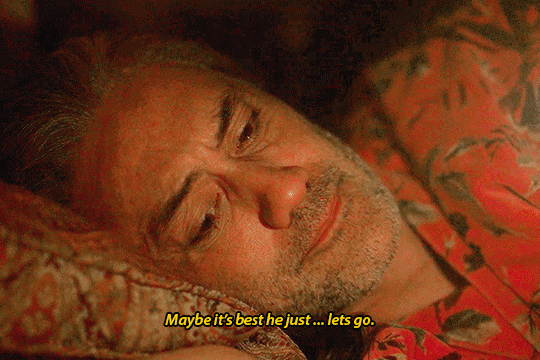
When Ed tells Lucius a song that goes "fingers bleeding, down to the bone now...hold on, hold on, hold on," Lucius recognizes it as a hell of a bad mental state. Lucius suggests Ed let go, and Ed says that'd be death.
Lucius then offers a third possibility: that dying won't be a death.
So Ed tries to throw himself into that. And when he actually sings, his song is the opposite of the one from before.
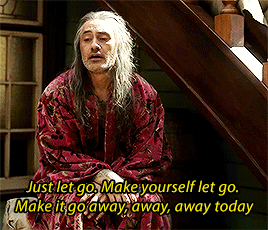
The stories we choose to tell reveal things about us. At the beginning of S1, Stede told a story about a wooden puppet becoming a real boy, pointing to his desire to "really live." At the end of the season, Ed's inner contradictory desires move from subtext to text through his amateur songwriting. He wants to hang on, he wants to let go and can't make himself, and "life's a hard sad death."
And then this all gets further mucked up when Izzy comes in and threatens "Edward," (who could get reborn) and says only "Blackbeard" gets to live. Ed releases his silk and throws Lucius over the side: the third options Stede and Lucius have made him drram of are out of reach.
Except then, when Ed embraces Blackbeard, he's embracing death: he paints himself up to look like a fucking ghoul.
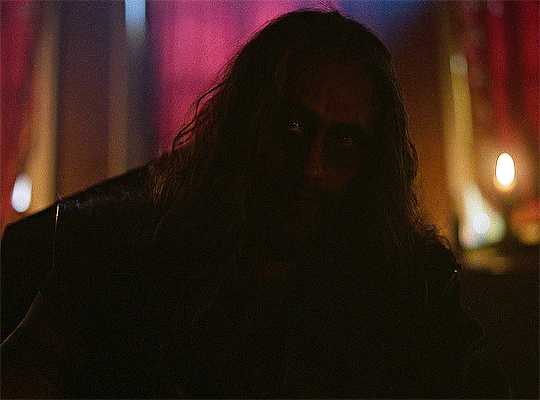
Wanting to live and wanting to die are basically the same thing for Ed now. He's got no lighthouse to steer away from or toward (and a lighthouse is after all another double symbol, something to guide and something to avoid).
And finally we get Ed's story in S2E1, about a bird that "can't actually exist." Ed wants to live, and he wants to die, and he wants to be a bird that spends its life in the air, that exists outside of the struggles of life and death, that just keeps flying without any differentiation between where it came from and where it's going. But the bird is also a version of that third option, to live and die at the same time: It's alive and it's dead, its whole existence is in the sky and therefore it never really lives, never stops, never feels or hurts. It's everything and nothing at the same time, suspended.
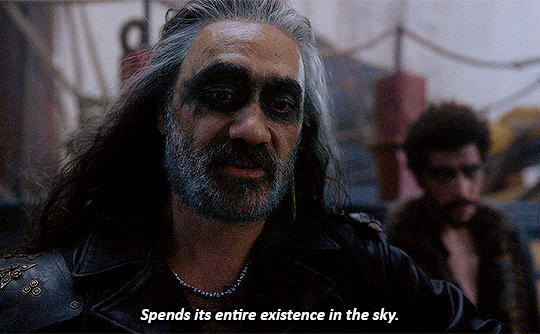
And even when Ed makes a decision that should end the conflict between wanting both life and death--decides at the start of E2 that he's going to die today--he doesn't go at it directly. He tries to get Izzy to do it; he provokes the crew to mutiny, leaving repeated openings to be stopped while also plowing forward. Until, finally, the decision is taken out of his hands.
The result of all this is internal conflict manifests externally and drives the plot at the start of S2. The conflict is seeded from the beginning, as Ed reigns over violence while barely participating, moons over Stede and threatens Izzy.
And from the moment Izzy confronts Ed, knocks him out of his state of "flying," Ed does things that contradict each other. He asks the crew if "the vibe is poisonous" while pointing a gun at them. He points a gun at his own head and asks if the vibe is poisonous, then tells the truth, to general confusion. He says he doesn't feel crazy while doing something clearly crazy. He shoots Izzy, then tells Frenchie to kill him. If Ed wanted Izzy dead, he'd have chosen someone else. Frenchie isn't the type to slit a throat in cold blood, and Ed's not a moron. There was no way that was going to happen.
Or so he thinks, because then he's in the gravy basket. Hornigold represents his unconscious, his desire to both live and die: First, Hornigold saves him. Drags him off the beach and forces him to eat, to keep living. But then Hornigold drives him to despair, brings up the core crises of guilt, loss, fear, and insecurity (his dad's murder, Stede leaving) that pushed Ed down the path that led him here. And in the end, Hornigold speaks Ed's insecurities back to him. That he's unlovable, and that he's scared to do the only thing to do about it: kill himself. So he brought Hornigold to do it for him.

And then Ed's living and dying at the same time, again. He's struggling against the rope, and he is the rope hauling himself down.
Everyone needs help, sometimes.
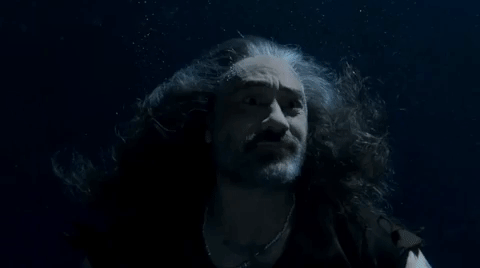
Ed sees Stede as a merman, "Something that can't actually exist." But something Ed hadn't expected. Down here, in his darkness and unconscious, a light. And then the pros outweigh the cons by quite a lot, and he doesn't even notice when the desire for death fades away.
He isn't a bird that never touches ground: he's on the ground, he's under the water. But he is something that he thought maybe couldn't exist. A version of himself that can change.
Ed gets what he really wanted. He dies, and he lives.
#ofmd s2 spoilers#ofmd#ofmd s2#our flag means death#ofmd spoilers#ofmd meta#ed teach#blackbonnet#stede bonnet#gentlebeard
141 notes
·
View notes
Note
do you think the multiple timeline plot is a plot point that’s more introduced in S4/for the HenVecWard TM plot specifically?
Like is there anything from earlier seasons/not related to Henry you would consider as proof that we’ve been seeing multiple timelines the whole time?
I think it would be kinda odd if multiple timelines are so important to the plot but there’s only real proof of it in S4 so that’s why I’m asking
I LIKE COMPLETELY 100% BELIEVE IT BUT IM REWATCHING RN AND I WANNA SEE IF THERES ANYTHING I SHOULD BE LOOKING OUT FOR
OOHOHOHOH SO!! THERE IS A LOTTTTTT OF ALTERNATE TIMELINE STUFF IN PREVIOUS SEASONS!!!
I totally agree that it would be odd if there was only proof of it in S4- thankfully, there’s evidence across all seasons!
So, let’s get into it!
Evidence of Multiple Timelines/Timeline Weirdness Prior To Season 4
So, one of the main things re: multiple timelines pre-S4 is Will’s vanishing. I touched on this in the Edward video too, but I also have a bunch of posts on it!
Basically, we saw two different Wills back in S1, each possibly from a different timeline.
I made this post, this post, and this post about Warm Will versus Cool Will, but TLDR, we see two different Wills on the night he vanished, one with longer, shaggier hair, who looks older & more exhausted & has cooler colour grading (hence why he’s Cool Will) and one with shorter, neater hair who looks younger & less tired & has warmer colour grading (hence why he’s Warm Will):
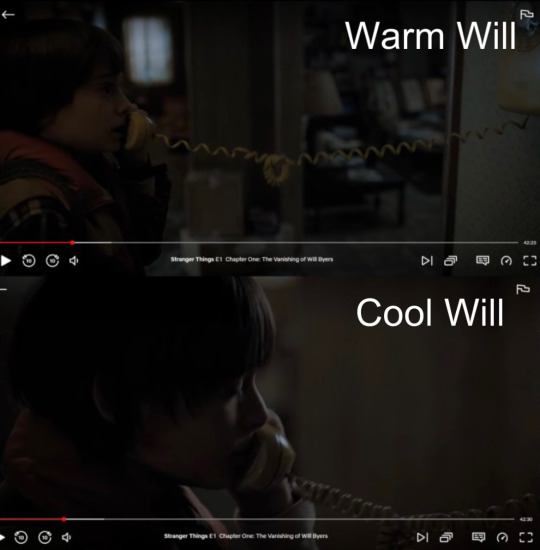
And there’s also the two different versions of the Byers’ phone- both versions of the Byers’ phone have “AREA CODE 501” written on the white part, but one version has nothing else underneath “AREA CODE 501” whereas the other version has some extra, unreadable line of text under it:
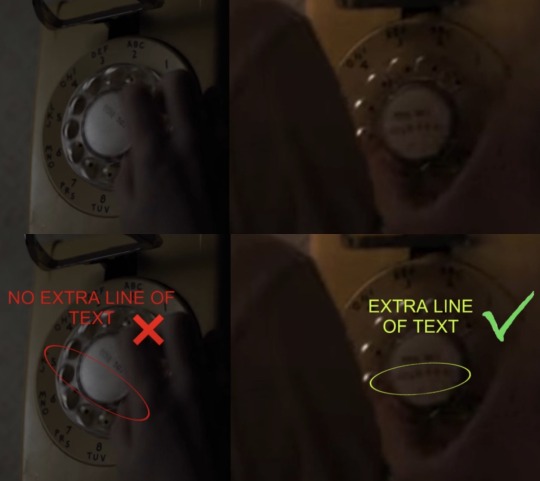
Which, not only is “501” the wrong area code for Hawkins, but “area 501” also connects to NINA (and all of the NINA timeline weirdness as a result), because the NINA coordinates from S4 lead to area 51.
And then there’s also the two different Wills in Castle Byers- the Will that El sees in Castle Byers in the void is different than the Will that the audience saw singing in Castle Byers (see this post and this post).
How are they different? Well, the Will that El sees in the void is more exhausted, barely able to move or speak- whereas the Will that the audience saw singing in Castle Byers has enough energy to sing and shiver.
And each of them also has a different version of Castle Byers- the Will that El sees in the void has drawings on the wall that are a.) in colour and b.) noticeably wet, wheres the Will that was singing and shivering has drawings on the wall that a.) have no colour and b.) are dry:
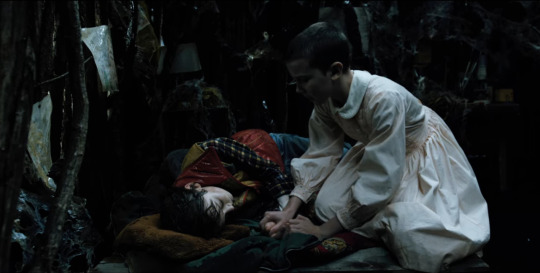
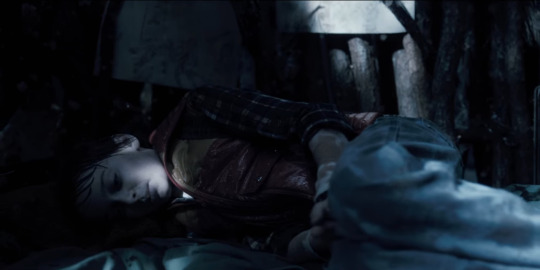
And one of the BIGGEST pieces of evidence of multiple timelines in the whole show actually comes from the end of S1 & then ties into the beginning of S2- the newspapers.
I talked about this in this post, this post, and this post, but the article we see at the end of S1 about Will’s vanishing has a TON of alternate timeline stuff.
It’s the article that mentions Richard Brenner, who’s likely Martin’s timeline counterpart or something along those lines (ie if Martin was Henry’s Brenner, Richard was likely Edward’s Brenner, especially considering the connections between Eddie Munson and Reefer Rick versus the subtext there re: Edward Creel and Richard Brenner, especially with Reefer Rick being a drug dealer versus Richard Brenner being the head of narcotics at HNL) (see posts like this post and this post and a bunch of other posts LMAO)
Not to mention all of the weirdness with Joyce in this article, and the fact that according to this article, Joyce claims that she found Will as a test subject at HNL, with no mention of the upside down:
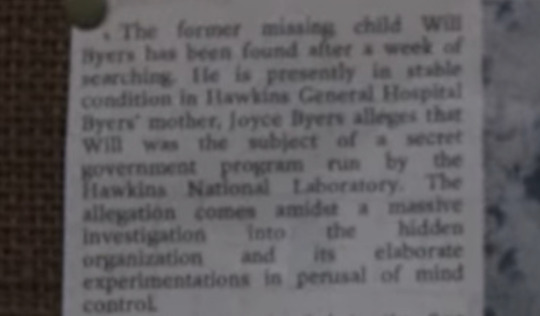
Which ties into something I’ve talked about re: how it’s weird that the lab let will go to a normal hopsital- they were ready to straight up KILL HOPPER to prevent any info about the UD/lab getting leaked, and yet, they supposedly just let will go to a normal hospital instead of keeping him at the lab?
Plus, we never actually SAW joyce and jim leave the UD or the lab with Will- if they somehow escaped the lab & got will to a regular hospital after escaping the lab, how did they get through all of those guarded and locked doors that they had to go through to get to the mothergate?
Especially without a keycard and being vastly outnumbered + carrying a dying kid?
So, I wonder if that scene of Will at the hospital might be a different timeline where Will was found in one of the rooms at HNL, rather than in the UD, and if Joyce and Hopper broke in & got a keycard the way Hopper did earlier in S1/were able to get in and out of the lab & to a normal hospital more easily because Will was in one of the upper rooms & not down through all of those extra guarded doors/quaratine rooms that they had to go through to get to the mothergate.
Especially since that newspaper where Joyce seemingly claimed that Will was found as a HNL test subject also says that Will was currently at Hawkins General Hospital- which is where we see him at the end of S1, so it would make sense for those scenes to be the same timeline as that newspaper clipping (and therefore also in the same timeline as Richard Brenner):

And also, that S1 article is also DIFFERENT from the S2 article about Will’s vanishing despite the two of them seemingly being the SAME ARTICLE, with the same title, the same picture, and the same author (Benjamin Buck), but with different content- they seem to be alternate timeline versions of the same article.
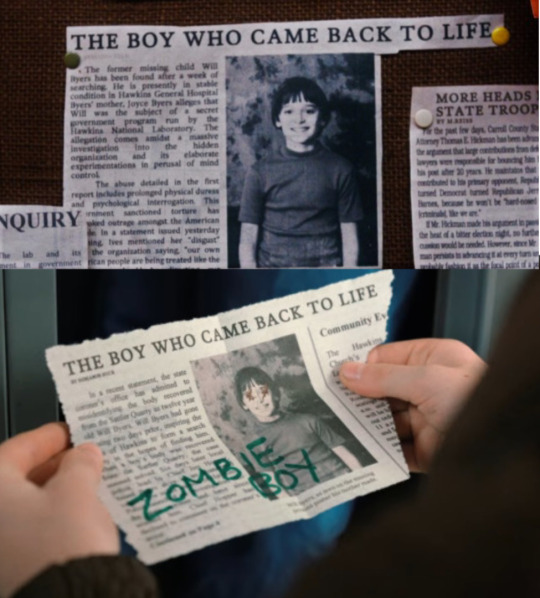
There’s also the matter of Will’s poster and eye colour- the S1 poster says that his eyes are brown, but the Will we see in S2 has greenish-greyish eyes. So, yet again, we seem to have two different Wills, especially since they make a point of showing us what Will would look like with brown eyes when flayed, so they arent just calling his green eyes “brown” as a catch-all term.
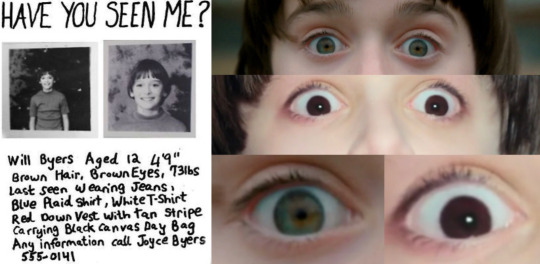
Which, speaking of Flayed Will’s eyes, why did Will’s eyes turn brown when he was flayed but Billy’s eyes didn’t?
Why did Billy’s eyes stay blue (although sometimes becoming a more saturated shade of blue much like 1979 massacre Henward’s eyes) whereas Will’s turned brown?
I personally wonder if Will’s eyes changing colour is connected to all of the twinner/timeline stuff, especially with the scene in TFS where Alice asks “Henry” where Henry is and “Henry” responds with “he’s right here,” as if he himself isn’t Henry- does flaying somehow combine the two versions of people from alternate timelines?
And as a result, did we get Edward and Henry in the same body/connected mentally somehow/combined (therefore explaining that Alice scene), and were the two Wills combined, therefore explaining the eye colour change if the other Will has brown eyes?
I feel like there’s something here re: flaying & the idea of the hivemind being active across timelines (ie if two people are flayed, but theyre both in different timelines, would they be able to communicate with eachother via the hivemind/would they be connected to the same hivemind?)
Is that why Billy’s eyes didn’t turn brown? Because Billy’s alternate timeline self also has blue eyes? Anyway!
S1 is also the season where Mr Clarke brings up the idea of parallel universes/infinite alternate timelines:
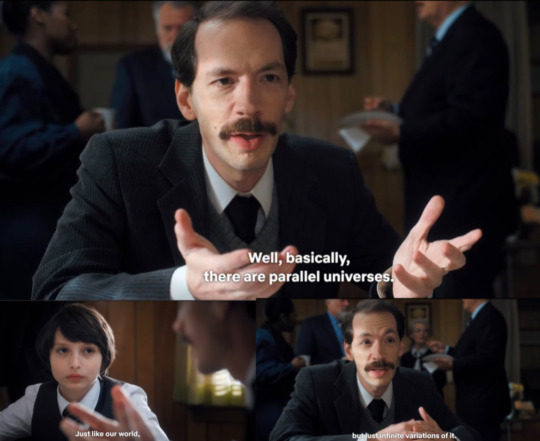
And Connie Frazier from S1 is likely Alice Creel- but not Henry’s sister, Alice- Edward’s mother, Alice (see: this post ), hence how she’s still alive after 1959- she’s not the Alice that we saw laying dead on the floor, this Alice was an adult in 1959 & is Edward’s mother, not his sister, and is Victor’s wife, not his daughter, as according to the Edward paper/Indianapolis Gazette, Edward’s mother was named Alice and his sister was named Virginia, his mother and sister are swapped compared to Henry.
And then, in S2, we have my beloved 8:15gate, which, TLDR, there’s footage on Bob’s JVC on Halloween when Will was using it to record that a.) has timestamps that change when they shouldnt (ie, when Will was supposedly recording the footage, it says 8:04, but when Joyce watches that EXACT same clip back, it suddenly says 8:15) and b.) has footage that shouldnt even exist, because some of the scenes that he supposedly recorded are scenes where he HAD THE CAMERA DOWN AND WAS NOT RECORDING! That footage shouldnt even exist! And yet, it’s there, with a messed up timestamp.
Not to mention all of the stuff in S2 that directly contradicts TFS & reinforces the idea of multiple timelines (for example, in S2, Bob talks about how Joyce didnt even know his name in highschool- whereas in TFS, not only do the two know eachother well in highschool, but Bob also claims to have known Joyce since first grade).
And in S3, there’s a bunch of stuff (including the idea that S3 is its own weird timeline), but one example is what I talked about in this post re: the reference to temporal displacement in S3 and there’s a bunch more in S3/I’m just keeping this relatively brief LMAO!
And that’s not even all of it across the seasons! Not by a LONG shot, these are just a few little examples! The multiple timeline weirdness stretches all across ST, through every season and affects every character- although Henward is more overtly tied to it than the other characters, ALL of them are still tied to it, and there’s evidence of multiple timelines in every season- hell, like I said, some of the best evidence comes from S1, because that’s where we find out about Richard!
#stranger things#theres sm more here but i was slow to teply to this and just wanted to get the reply out#but theres SO MUCH MORE out there across the seasons
48 notes
·
View notes
Text
Look, I personally lose nothing if Lokius doesn’t become explicit canon. And if that were to become the case, I’d also have no regrets for saying for years that that would happen in the show by the end ¯_(ツ)_/¯
I’ve said it before, but by now it would be Disney/Marvel’s loss, NOT mine. Whoever wasted or limited the potential would be the idiot, not me.
I’m simply never gonna feel crazy for noticing what’s happening in a story or silly for daring to hope it’ll be brought to fully satisfying narrative completion. That's just a me thing. Maybe this is because at heart I’m stubborn! But I’d like to think I’m not unreasonable. I can’t control whether writing stays consistent or censorship is overcome... But I just do my best to construct solid arguments, and as long as those arguments remain solid, I stand by them :)
I know not everyone would say the same, or they consider this to be "hope" or "optimism," but I see it as logic based in noticing what the text of a show/story is doing. And personally I also consider blatantly evident subtext to be "canon enough," so if we get my personal minimum, my happiness may still outweigh any potential disappointment for me.
However. Here's what I've come here to say today, in reaction to things I've seen floating around in the fandom:
While I do understand on some level why people worry that Lokius won’t be more explicitly canonically romantic because it could be censored by Disney.... At this point, I don’t understand how people can think Loki/Sylvie will still happen.
As of right now, there’s no way to argue for that in my opinion. (I'd like to see someone try.)
The show has set up a fun but very simple situation from basically the start:
They made romantic love a point of relevance in the show’s story. More specifically, they pointed out Loki's desire for a "real" romantic love, and had him learn the lesson that he doesn't deserve to be alone. They didn't HAVE to do all of those things and tie them together. They CHOSE to make romantic love relevant – and they have actively continued to choose to do that, to the point of including a mirrored dark love triangle in s2 ep3. That narrative thread simply has to be fulfilled.
So if they deliberately established that Loki wants and needs a “real” love, and his relationship with Sylvie was referred to as "fiction" so she cannot be a real love for him.... Who does it have to be?
Obviously it has to be Mobius. And of course, the whole show points to Lokius also, for countless more reasons than just this simple breakdown. But pointing this element out is the simplest argument one can make.
So either...
1. They take Lokius to full narrative completion with explicit canon, as they should and as I expect them to,
or
2. Loki's desire for a real love is left unfulfilled, open-ended, and/or made clear through subtext that it's Mobius.
Those are the options, if you ask me!
This is aside from how Lokius’ love story is now even at the core of the show’s themes and plot, which is an insanely strong vote in favor for their future canonicity.
But for the purposes of this post, I’m talking about whether we'll get explicit romance specifically, like a love confession or a kiss – and I do actually genuinely think we'll get both of those things. I'm not trying to force you to agree with me, but just to be clear, that's where I'm at with it and have been since 2021 lol.
So in regards to worrying about Loki/Sylvie...
They were never really a romance (yes, even in season 1) and they sure as hell aren't now. I can’t imagine they'll become one even IF Lokius is left subtextual.
So what actually remains to be seen is if the writers got to go all the way with Lokius, or if that central queer love story was censored on some level in the end.
My hot take is no one should be ~worrying~ about Sylki at this stage of the game. Free yourselves, people.
If the story starts abruptly going in a Sylki direction, even with only 3 episodes left, I will certainly be the first to say so lol. But I simply sincerely, truly doubt that'll happen.
(Hot take in the footer: this is not the post to get into this at length, but in case this comes up… In this house we do not use the word "queerbaiting." It is a useless, nearly-meaningless, insufferable term that devalues the legitimacy of subtext and queercoding more often than not; it's rooted in the idea that media must hit arbitrary and inconsistent checklists often set with cishet approval in mind; and it perpetuates a focus on the false and harmful myth that many creators are "cowards" instead of leaving room for nuance and the fact that industry censorship still exists.)
#in theory: either we win or we REALLY fucking win.#felt worth posting this little disclaimer since some people are starting to actually see my meta over here?? which is new. hi#how many times can I remix and expand upon my old words from twitter to make a larger tumblr post? the limit does not exist#loki meta#lokius meta#loki#loki show#loki series#chars loki posts#lokius#meant for this post to be shorter. F#I'm not even done crossposting all my meta from last night yet. sorry to all my tumblr followers
76 notes
·
View notes
Text
A few recent books I've read and disliked led me to this conclusion but it feels like there's been this switch over time with queer stories. It used to be that queer relationships (or queerness in general) had to be Show Don't Tell because, well, you could not make them textual! So you get, for example, shows like Legend of Korra, or Xena: Warrior Princess, where you have women who are clearly devoted to each other to a degree that goes beyond mere friendship, and a ton of effort and care is put into that depiction because they can't actually be shown in an explicitly stated relationship. And as a result, these relationships, while they never receive confirmation in the show, are rich and complex.
Now not only is it much easier to make explicitly queer stories outside of niche areas; it's even popular (and, cynically, a marketing tactic). The problem is I've run into a bunch of stories that are marketed very clearly as A Queer Story that forget to like...be a story, or show me why these characters should be in a relationship. It's All Tell No Show: I'm told that the characters are gay and are in a relationship, but no work is done to actually explain why I should care about this beyond "well they are gay and in a gay relationship."
I'm not going to rehash what I discussed here, but Baru Cormorant is an example of those books where I'm given no real reason to care. The protagonist is a lesbian but the prose reads like a phone book. On the other hand, while Starless has a queer disabled woman as a one of the two protagonists, it also provides her with traits other than "queer, disabled, woman, important" and grants her a rich interiority (even though the story is told entirely from the first person point of view of the other protagonist.)
And the thing about the good examples in that link (Starless, Teixcalaan): they show and tell. It's both explicit that these are queer stories with a canon romantic relationship, but the little moments that make up the tapestry of a relationship are given the time that moments in a subtextual - or frankly, even a queerbaiting work are. That's the real tragedy; for queerbaiting to work, you have to actually make the relationship compelling enough for people follow it until you pull the rug out from under them; whereas you can slap a cold fish kiss on a cold fish queer relationship and technically you are Better because it was Explicit Representation even though everything about it was poorly constructed. I would rather have an lazy and shoddy explicit relationship than queerbait just on principle; but honestly I'd rather have a good story that does neither.
One of my more cynical interpretations of this is that writers are either intentionally or inadvertently taking advantage of the legacy of the Show Don't Tell era of queer coding to place the burden of those small moments on the audience. They know that people looking for queer relationships in fiction are used to having to dig for moments and subtext; but instead of providing that subtext, they set up the clunky text and assume the subtext to support it will emerge from the fandom. Or perhaps, more generously, especially for younger queer writers, they are just so used to having to provide that work themselves that they forget they are doing the writing and are able to (and should) layer subtext and text together and weave something actually good.
Either way, it's this that's led to the "Lesbian necromancers in space, need I say more"* era of recommendations, taglines, and writing, in which explicit representation is, if not plentiful, at least available; but a worrying amount of it forgets to actually write realized characters or a relationship with chemistry or a plot that makes sense.
I should also note: there's obviously a TON of straight romances and books that range from mediocre to abominable. I am under no circumstances arguing that "gayboring" media shouldn't exist. But while I don't think queer stories should be held to a higher standard, I don't think I should be obligated to settle for a lower standard either simply because it's gay. I know it's fraught, in that we're at risk of publishers and producers taking away the message "people hate this because it's gay" rather than "people hate this because it's poorly developed," but like...at the very least, could we recommend things in terms of "this is a great book that has a wonderful queer romance" and "this show is gay but it is also deeply mediocre, and if it weren't gay I wouldn't recommend it at all; do what you will with this information."
*I should note: I happen to like The Locked Tomb (of Lesbian Necromancers in Space fame) a lot! I know it's not for everyone; I know it can feel very gimmicky at times. But no matter how you feel, that tagline is DIRE and does a miserable job of representing the books. Like, that premise could suck, actually (and plenty of people find it does) if you're not sold on the mere fact that it's got lesbians, necromancy, or space in it. Worth noting that neither Starless nor the Teixcalaan books were heavily marketed as Queer Romance Fantasy/SF even though both very much are, which does further make me think this is a case of people writing good books that are queer, vs. people writing books with the intention to be on some New Queer SF list or, god forbid, Booktok.
#long post#the book i read this week (light from uncommon stars) was also like. really hit or miss#the locus review of it is spot on. like. i think one of the characters' stories is fantastic but i think it's afraid to have any bite.#also this was out of scope for this post but like. i have recommended terra ignota before#and like. it is saying THE MOST about Gender since Le Guin or Butler imo. but it's NOT marketed as queer at all#and part of that is that it's really not capable to read it as a romance (certainly not a happy one) despite there being queer pairs in it
117 notes
·
View notes
Note
imo there’s a difference between “queer coding” and very specifically playing to both sides whether or not the writers/artists/directors intended to make a character queer or not. I think that for enstars specifically, with the new valkyrie event, while people are happy that some characters such as shu and mika in the new event are being shown expressing their love for each other and their views on their sexuality and expression, people are frustrated that it is not explicitly said because of the company’s need to not confirm a character as queer in order to not alienate (homophobic!) fans. Because at the end of the day in happyele’s eyes, if that homophobic fan spends a lot of money on the game then they’re worth pandering to (shrug emoji) And I mean some people also just don’t like shumika
anon i understand where you're coming from but i think you are wildly missing the point in my original post
my point is EXACTLY that if you need the characters to walk up to the screen and say "i'm gay" or "i'm [insert some 21st century-friendly label]" or "this is my boyfriend" for it to count as queer media in your eyes than i think you need to do some reexamining about what exactly your views on queer media as a whole are
plus, they DO do this. they explicitly talk about queer themes out loud many many times in enstars. shu says to mika that they should, together, create the happiness that his grandfather was never allowed to have, after they spent the entire story detailing shu's grandfather's queer romance story. they probably kissed in hermitage, and the lyrics to acanthe talk about them kissing. rinne proposes to niki in every other story they appear in together. he told him to do a striptease during nightclub. tori has very explicitly gay feelings for eichi. arashi narukami exists. eichi, while talking to arashi in pretty mission, says "people like us," confirming himself to also be some form of queer. kuro calls keito an old word for spouse or husband. and SO many more examples. this is not "queer coding" or subtext, its just text.
in any case, authorial intent is generally of no interest when it comes to examining media. the conversation of what the author could have meant by something is wildly less interesting than the conversation about the ways in which the audience can interpret it. what the writers intended should have little to no place in the discussion. what we should be talking about is what the thing itself is saying, both implicitly and explicitly.
expanding your view on what exactly can be seen as "queer media" can only do you good. and it would do so much good to not give a shit about the possibility that homophobic people will also like the thing and interpret it as not queer. that is literally not my problem whatsoever, and it shouldn't be yours either.
what it seems like to me is that no matter what pieces of queer media will always be criticized in some capacity. if they're not explicitly queer enough, they're just bait and have no merit. if they are explicit, then they're promoting stereotypes, or its rainbow capitalism, or it's fetishization. there is no winning. the standards for queer media are absolutely absurd, but they don't HAVE to be. you don't have to look at a piece of media through this kind of silly cynical lens if you don't want to.
the discussion about a work loses so much interesting and important nuance when you try to shove it into a box of "good representation" or "bad evil queerbait." thats just really really boring way to view stories
#cryn answers#anon#enstars#i hope this clarifies my point more#also im not going to turn anon off but come on out dont be shy we can have a conversation face to face#media analysis
73 notes
·
View notes
Note
https://www.tumblr.com/olderthannetfic/729708592592306176/how-about-a-different-discourse-death-of-the
What this ask is missing, a bit, is that Death of the Author *does* mean that the author’s take on things is no more or less valid than anyone else’s. It’s about decentering authorial intent in analyses of media. Barthes is pretty clear and quite pointed about it in the original essay.
What bothers me about misuses of it and what I think this anon means to say is when people start decentering the actual *text*. The idea behind Death of the Author is also that the text stands alone. You don’t need to look at any extra shit to understand it. As you said, it was a response to a mode of analysis that obsessed over plumbing through author biographies.
The issue with what people do in fandom is they ignore the text. “I don’t like this element of canon, so it doesn’t exist.” (Which is different from arguing that it’s there but it sucks because of XYZ reasons, so I’m going to consciously ignore it in my fan works. This is when people just act like it isn’t there in the text in the first place.) “You have to take my bizarro world out-of-nowhere headcanon that is based on nothing except that I want it to be true, that I love this character and I wish they were XYZ therefore they are” and take it just as seriously as headcanons that actually engage with what’s in the show/video game/book/movie/whatever and use that as their basis (like building off something that is subtextual in the original work).
Granted we all do this to some degree, we all come to a text with our own biases and you can’t *always* easily separate those out, and that can affect, for instance, your interpretation of what the subtext is, but I think the irritating fandom behavior is when this kind of ignoring-the-text-to-substitute-your-own-reality is this very deliberate sort of laziness. The annoying thing in my current fandom is people who are fans of this one ship that they insist is the most progressive and other people just don’t see the scintillating “subtext” of because we are bigots or whatever, between two characters who don’t interact that much for two MCs and when they do it’s not at all shippy (but these characters both have very shippy subtext with different characters), but where these people think the ship *should* exist because of their identities. And their “evidence” for the ship is always gifsets taken way out of context and not including the dialogue that makes the non-shippy context for that scene very clear (including that it might actually be shippy for conflicting pairings). It’s like this bizarre version of “close reading” that strips out the largely context *deliberately* in order to make a particular conclusion seem more compelling than it actually is.
Anyway, all that ignoring-the-text stuff is STILL bad analysis per DOTA. Since the point of DOTA is to go based on the text, if you’re obscuring the text you’re kind of just installing yourself as a new author.
This is why DOTA doesn’t mean “anything goes.” It just means “authorial intent is just one interpretation that doesn’t have to matter.” It doesn’t mean other stuff we use in analysis doesn’t matter, and if anything the point is to make it even more text-centric than the older author-centric analyses were. People can still disagree about what the text says, of course, but they should both be going back to it in how they construct those arguments, and not, like those shippers, deliberately ignoring chunks of the text that weaken their arguments.
--
I don't think all of them are consciously throwing out actual canon, but they are often throwing out all context that would help evaluate subtext.
Like... if you're analyzing a Marvel movie, you might ignore what the director said in an interview, but you probably shouldn't entirely ignore the fact that it is a Marvel movie and apply assumptions that make sense for some arthouse film.
And, yes, if you're arguing for shippy subtext, even unintentional on the part of creators, "I like this ship because..." needs very little, but "This ship has more support than this other ship" requires going back to the actual text and looking at it in its totality.
There's a lot of faux-intellectualism around garbage like TJLC where people try to make themselves feel smart by using the language of close reading while having the media literacy of a bucket of rotting fish.
66 notes
·
View notes
Text
the thing is i really do loathe comic anissa.
‘why are you wording this like its twisting your arm to admit when this is actually a substantially common take, maybe the single most common take?’
well.
i do believe there is a lot about her writing that goes unanalyzed. i think there is an untapped font of metatextual exegesis that could explore the biases and stereotypes that informed kirkmans writing of her before she was set up to sexually assault mark, while she was, and after her poorly construed reform. i believe also that the most charitable read possible of the comic can actually string together something interesting about viltrumite eugenics (though to demonstrate its ineffectuality the comic ultimately validates their beliefs as often as they try to counteract them) and the vastly different circumstances of the most prominent acts of such assault and violation being linked by existing outside of imperial mandate while being products of imperial thought. i do have a soft spot for media that reminds the audience that sexual and reproductive coercion are part and parcel for imperial systems (even though the comic may be the schlockiest one ive encountered). i also don't agree with the white blogger mentality to be like “well mass murder is redeemable but assault is a bridge too far” especially given that i am not white so mass destruction of cultures actually kinda resonates lmao and given that there are other characters with far more numerous acts of racially coded sexual and reproductive bodily violations. also, when the fandom base opinion is that the two are exactly the same (they made her brown, even excusing the other changes, that should give people pause), i want to make it clear I under BOTH rather than seeming like my appreciation of one is somehow fanony. name another invincible blogger who can talk about the racial subtext of white comic anissa’s targeting mark because he was isolated from viltrumites and because of her disgust with the people of earth (i.e. he is the very mixed viltrumite she is afraid of giving birth to), and how her ending makes this reading Text as she ultimately settles with a man of color and has a biracial child to demonstrate how she has abandoned this mindset (and how her show version being racebent in addition to the other changes seems to address this), AND also the misogynist metatext of kirkman choosing the square jawed buzzcut angry woman to be the assaulter and the bad look of her being made shorter softer skinnier and even smaller chested after she was made ‘sympathetic’ and even just the fact that kirkman could not see her growing without becoming a mother. you cant.
but she also sucks ass LMAO i cant stand her.
#long ass ramble nooooooooobodys gonna read but i had to get it out there.#im bored and i need to POST !!#jesus j said so MUCH.
6 notes
·
View notes
Text
Okay fuck it yeah I'm making the post idc abt backlash. First of all the hidden agenda fandom doesn't exist anymore so whos even gonna have an issue. But if you do feel called out um. Maybe thats ur problem idk bc I'm not aiming at anyone in particular here.
Anyway long ass ramble abt the tiny dead Hidden Agenda fandom below the cut
This is mainly something I noticed looking through the very limited amount of Hidden Agenda fics on ao3, but it's VERY obvious on there. The vast majority of fics on there are centered on Adam and Finn, which I can understand more since they have an interesting backstory and are well written characters, sure. But then you look at the others and the other characters that are centered are... Riggs and Calvary?
In the actual game ofc Becky and Felicity are the main characters. Both of them not only are pretty objectively interesting characters on their own, and even more so together. On top of this they have the most shipping potential of any two characters in that game, it's literally basically canon, it's not even subtext atp it's literally just text. NO other two characters have that amount of chemistry in the game, and yet there is a noticeable lack of gravey fics in that tag. And I'll stress again bc I know how defensive people got last time I made this kind of observation, I'm not pointing fingers or calling anyone misogynistic/racist/homophobic BUT. but. When the two mcs are women, one of which is poc, and they're implied to be lesbians, and they get sidelined by the fandom despite being the focuses of the game... it's kinda hard not to assume there's some kind of bias there.
And on another point, it's similar when it comes to supporting characters too. In a way I'm disappointed but absolutely not surprised that Adam/Finn is prioritized in fan works over Becky/Felicity, but when characters like Riggs and Calvary are also given more attention than them it becomes way more suspicious to me. Riggs is a fine character, I like him enough and I can see why others might like him more, but wbk he doesn't really have all that much relevance. Calvary is even more confusing bc he basically JUST exists to be a creepy misogynistic asshole and as unlikeable as possible. Thankfully I haven't seen him getting a lot of attention but the fact that I've seen him getting any that isn't entirely negative is... hm...
Now there ARE in fact male characters that can be both relevant and likeable: Tom and Karl. (I talk shit abt Karl bc it's a joke I started with friends, I'm gonna drop that for this post obv bc we're being fr here) these two are pretty obviously more relevant than Riggs or Calvary, they're literally Becky's partners (Tom can even replace Riggs' entire role lmao, and if he's replaced himself it's by Karl) and I'd say they're also both likeable characters on their own too. And yet I'm pretty sure I found maybe one??? fic with them in it? Probably should have mentioned this earlier but yeah, they're both poc.
So like... I feel like it all comes down to what Becky/Felicity/Tom/Karl have in common and then what Adam/Finn/Riggs/Calvary have in common. It strikes me as questionable. But like maybe I'm just an annoying snowflake though idk🤷♀️ /s
This turned into more of a ramble than anything and I'm aware i'm also yelling into a void bc I'm posting entirely for a dead fandom that barely existed to begin with, but tbh this stuff applies to most if not all larger fandoms as well, i'm just looking at it from what I've seen in the remnants of the HA fandom. Again I am not attacking anyone here, I am making observations. If you're like mad or something I'm just gonna assume you didn't even read the whole post. Yes ur allowed to like characters, but I am also allowed to address what I've noticed about what characters seem to be more liked than others.
#uh oh#if I get burned at the stake for this one too then I don't even know atp#hopefully I won't be though bc not many people gaf abt Hidden Agenda#Hidden agenda smg#🏃♀️
13 notes
·
View notes